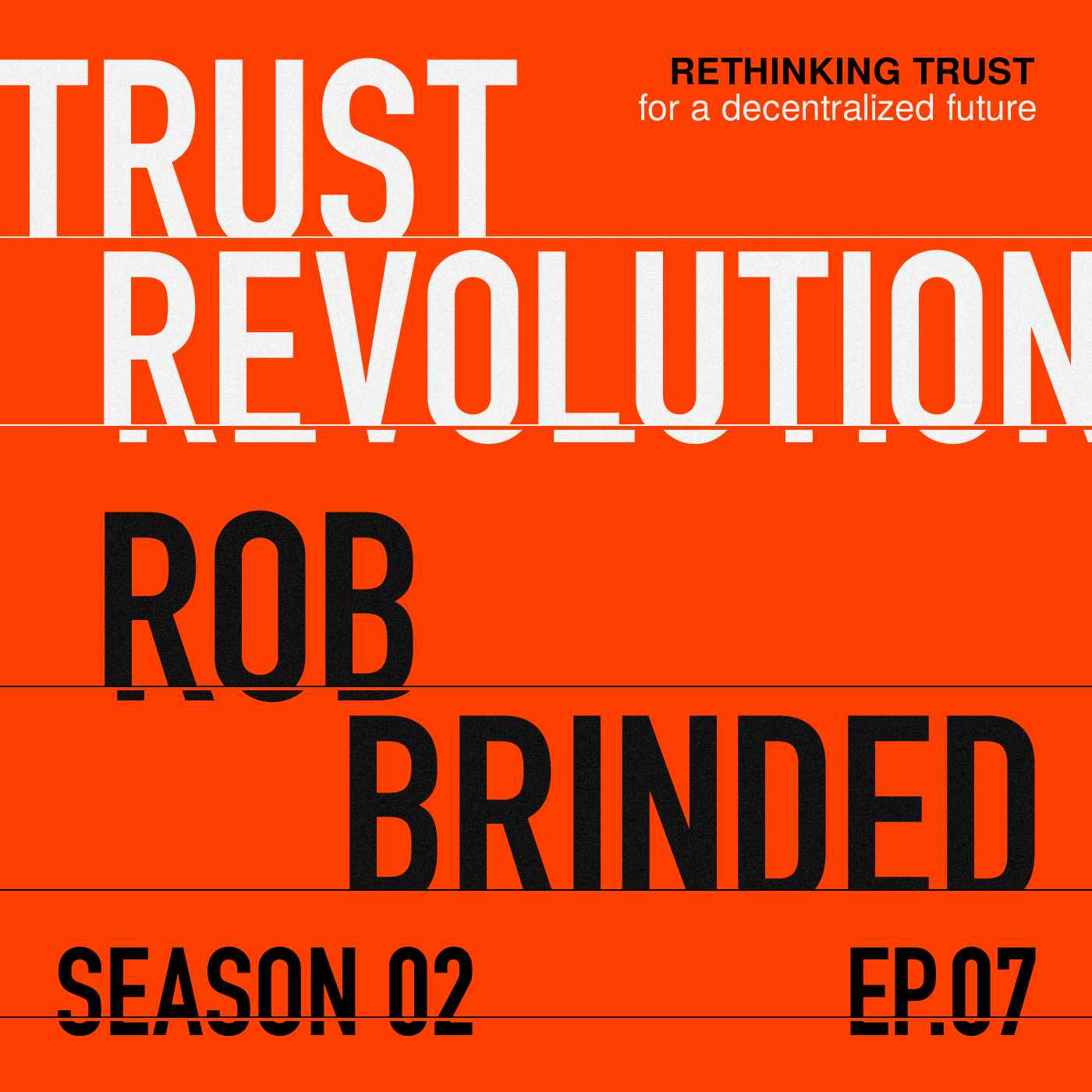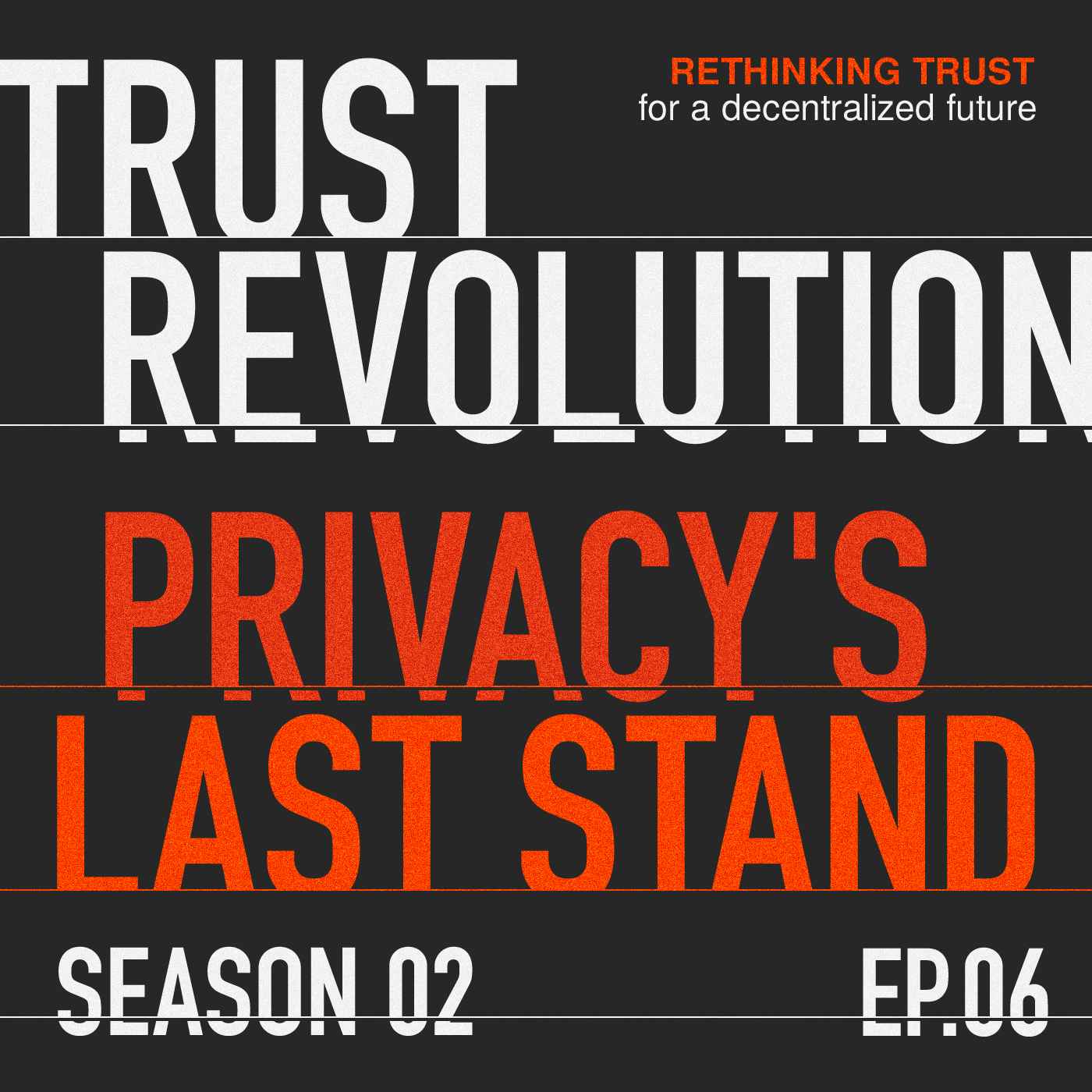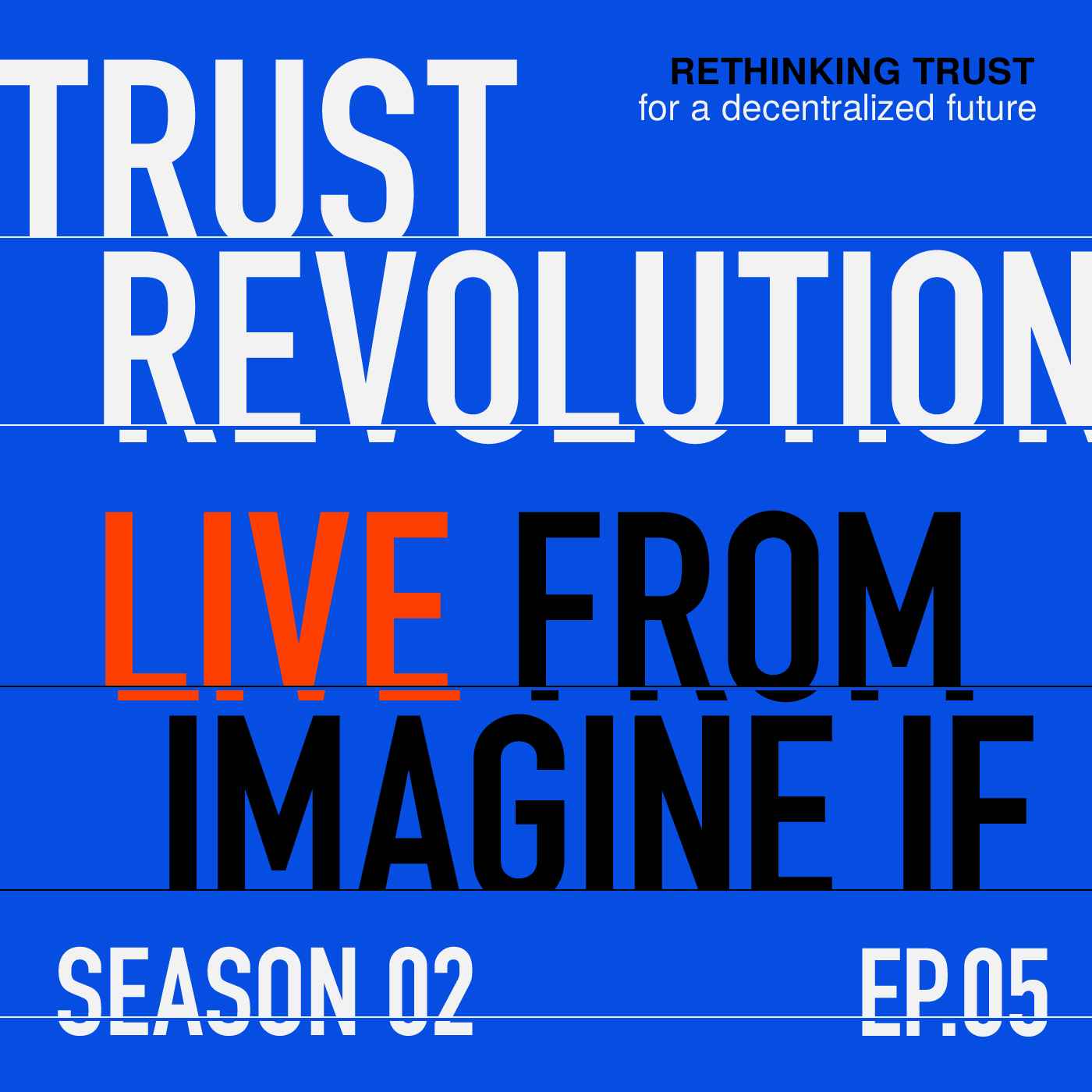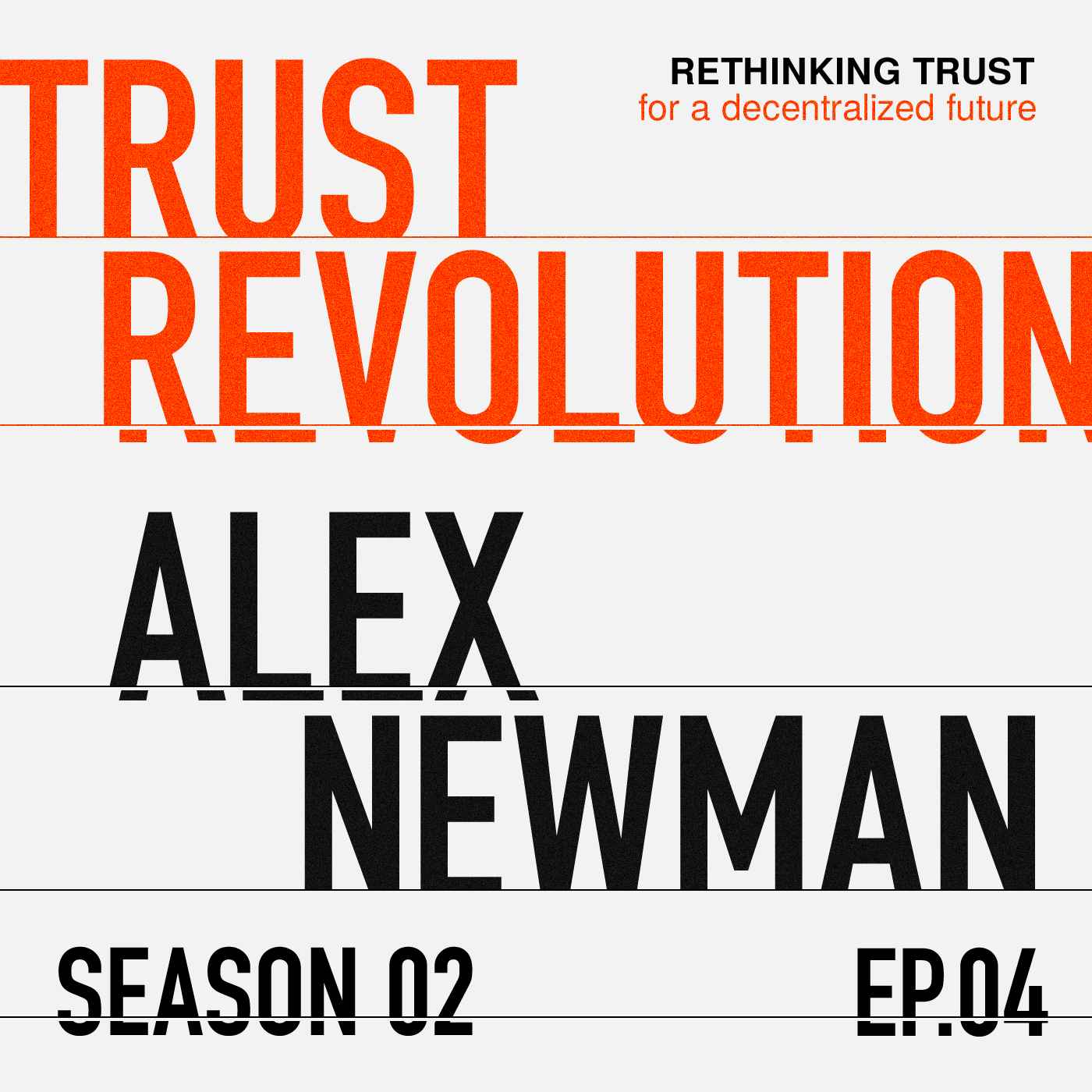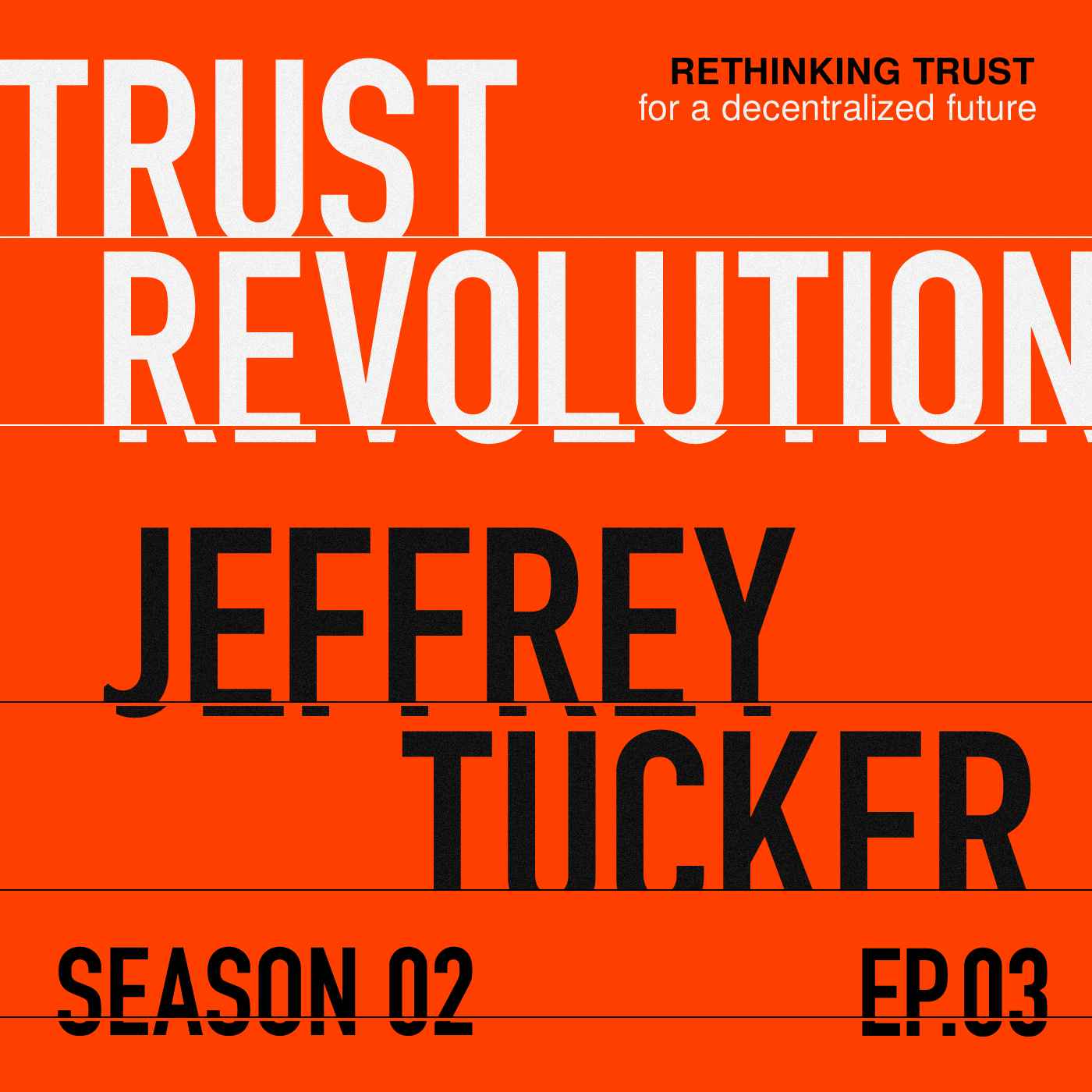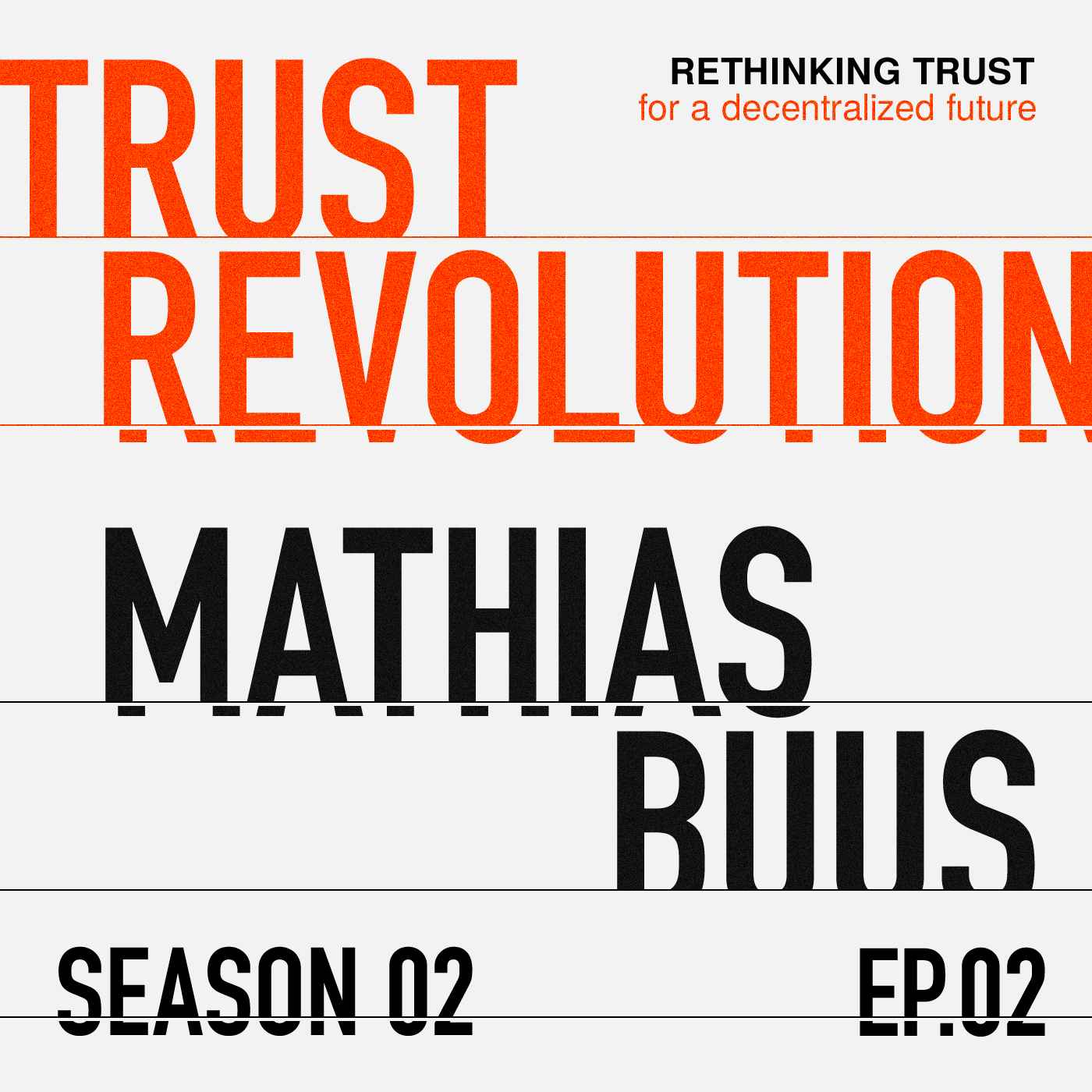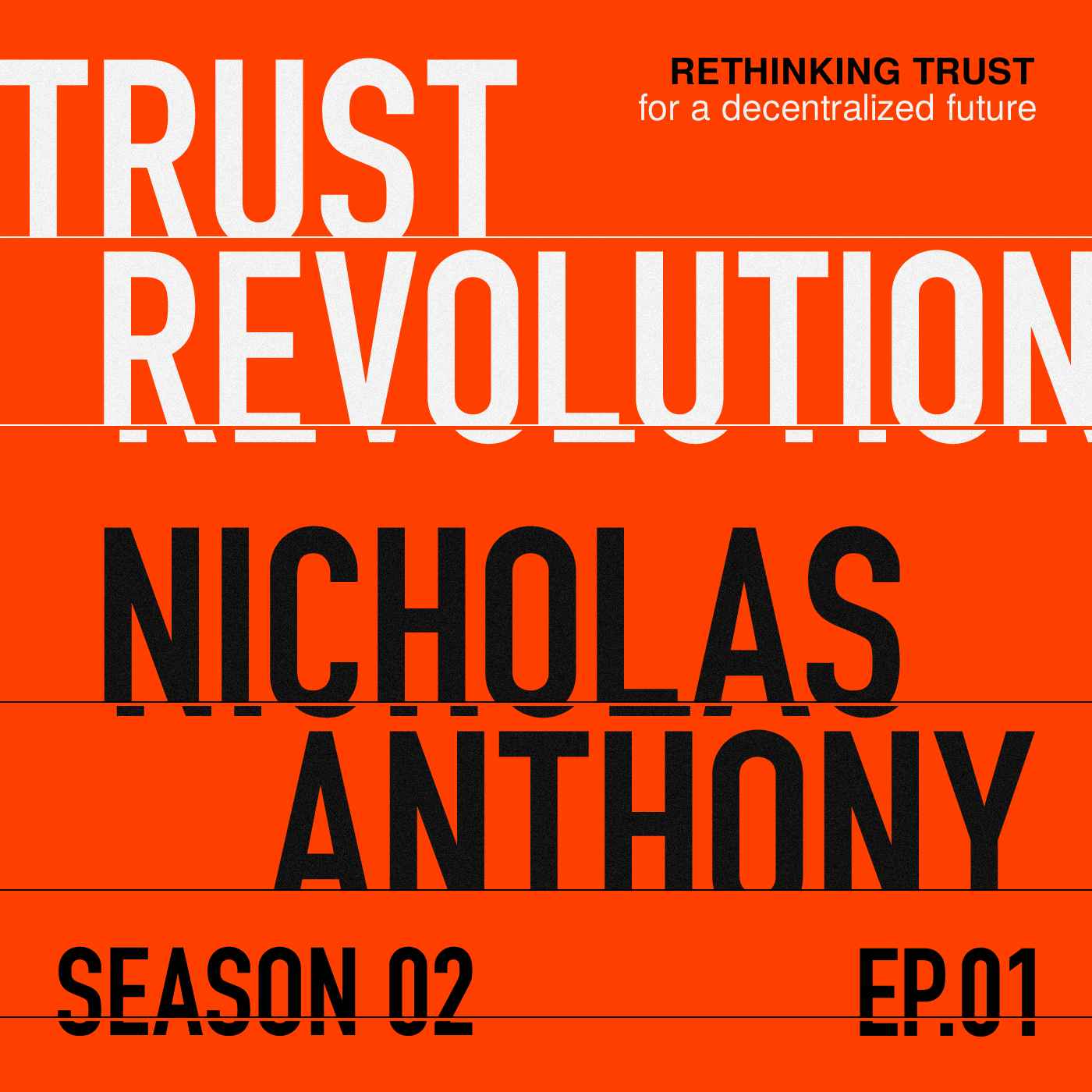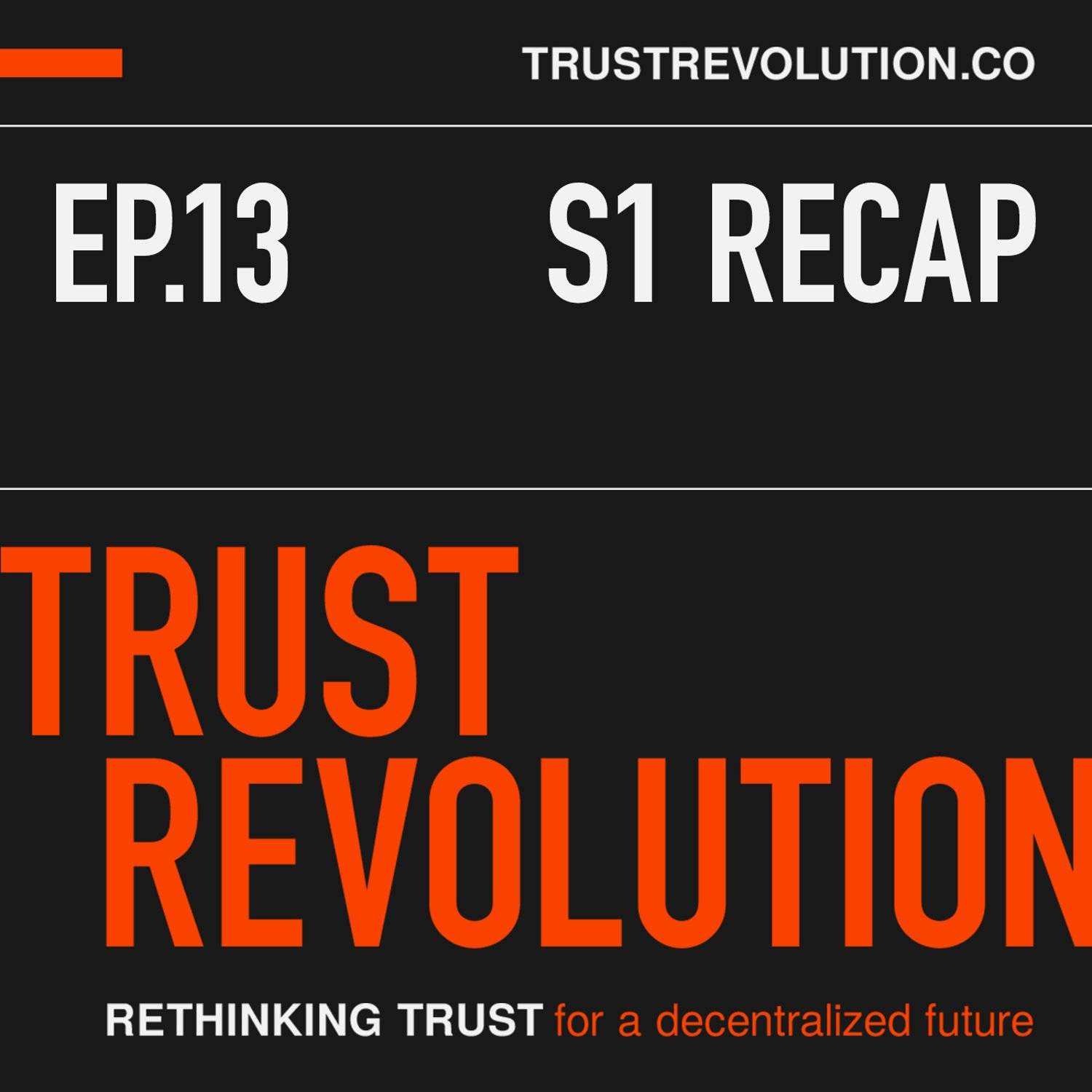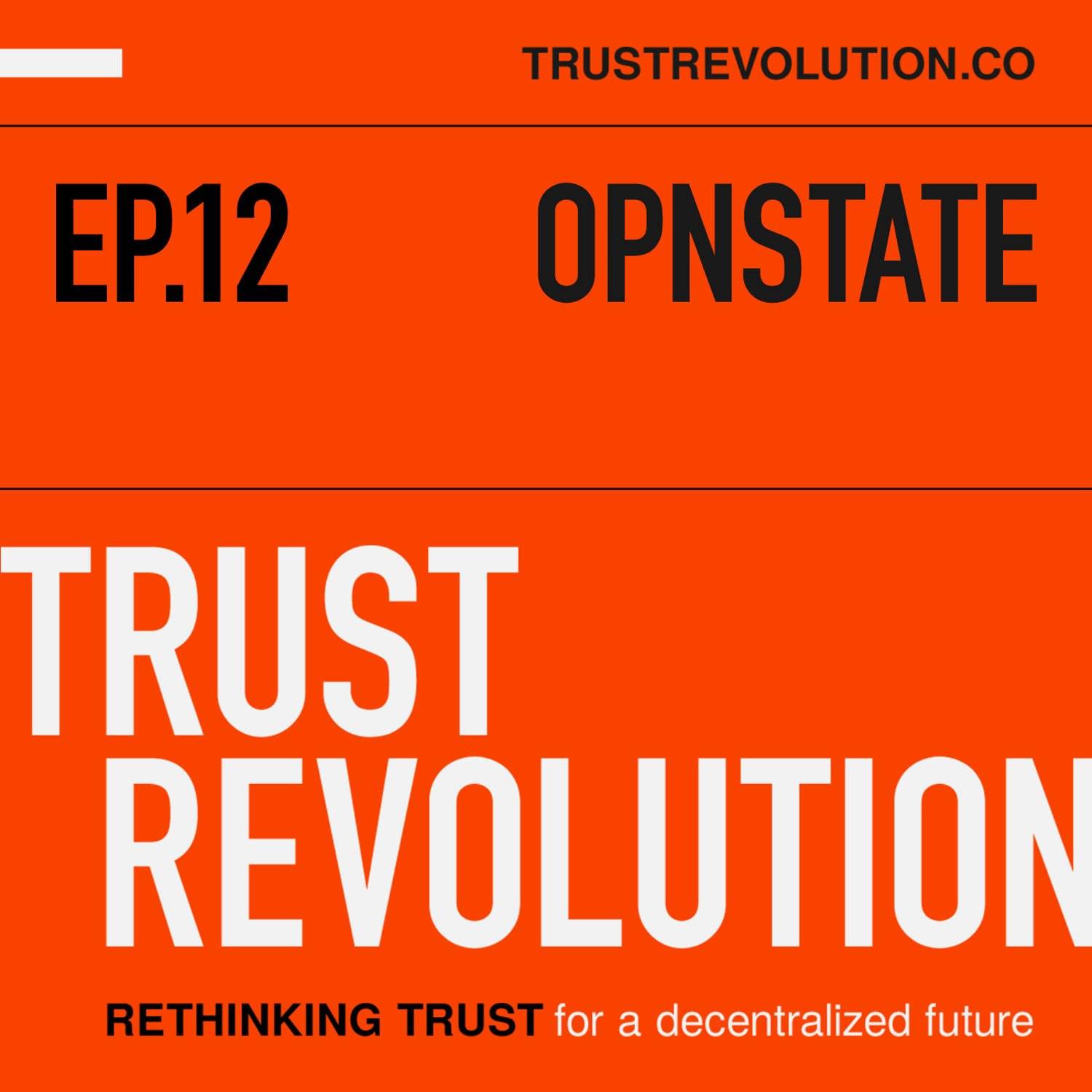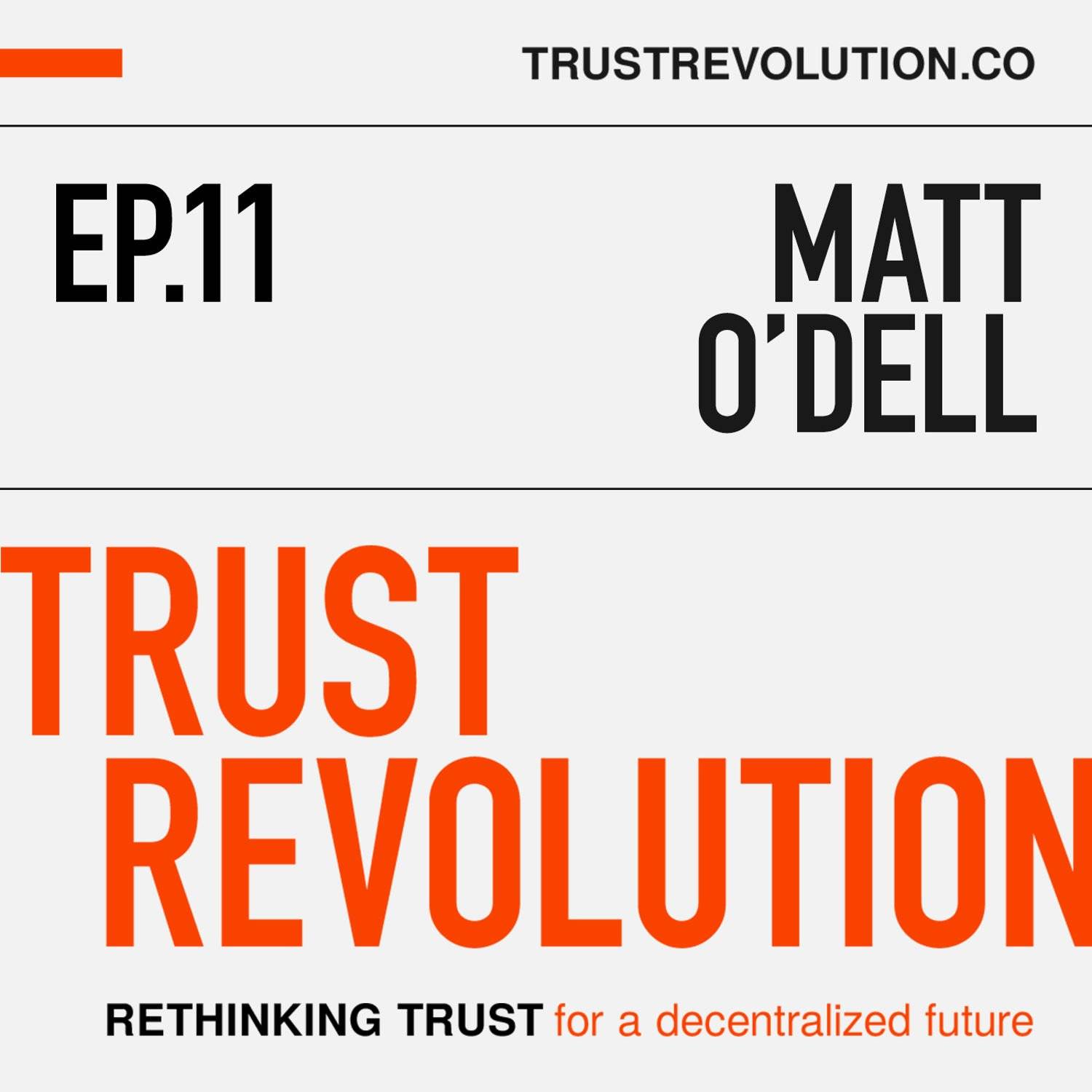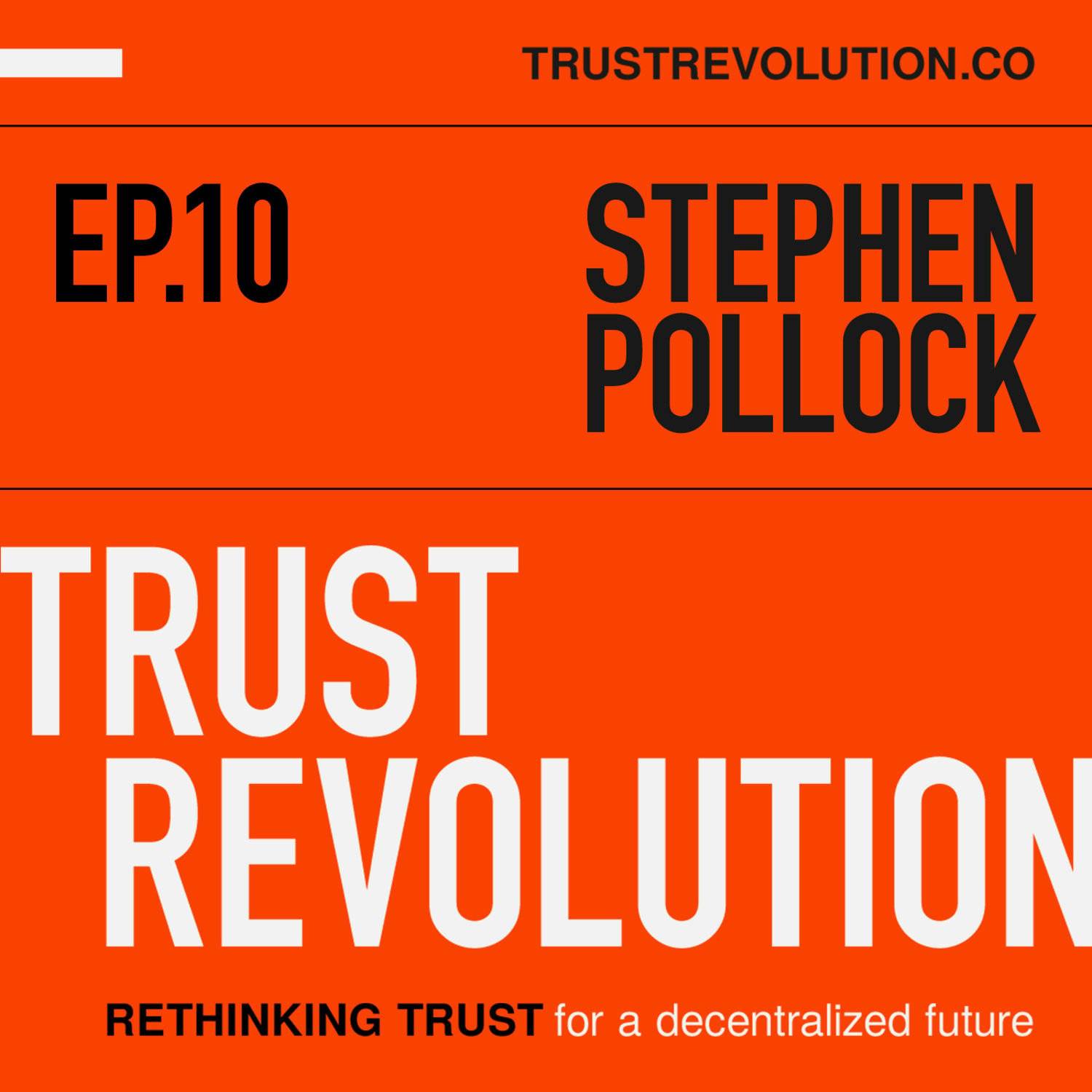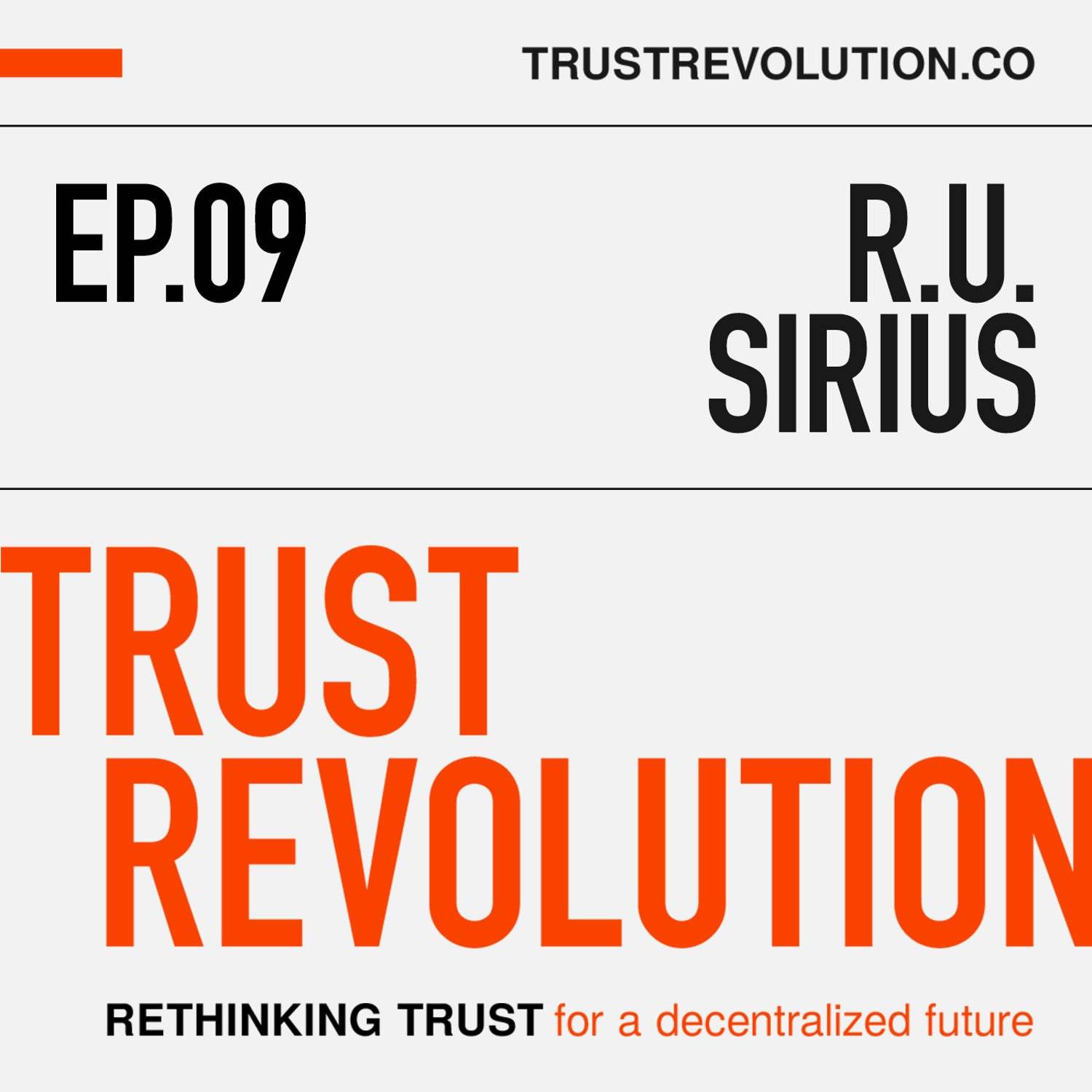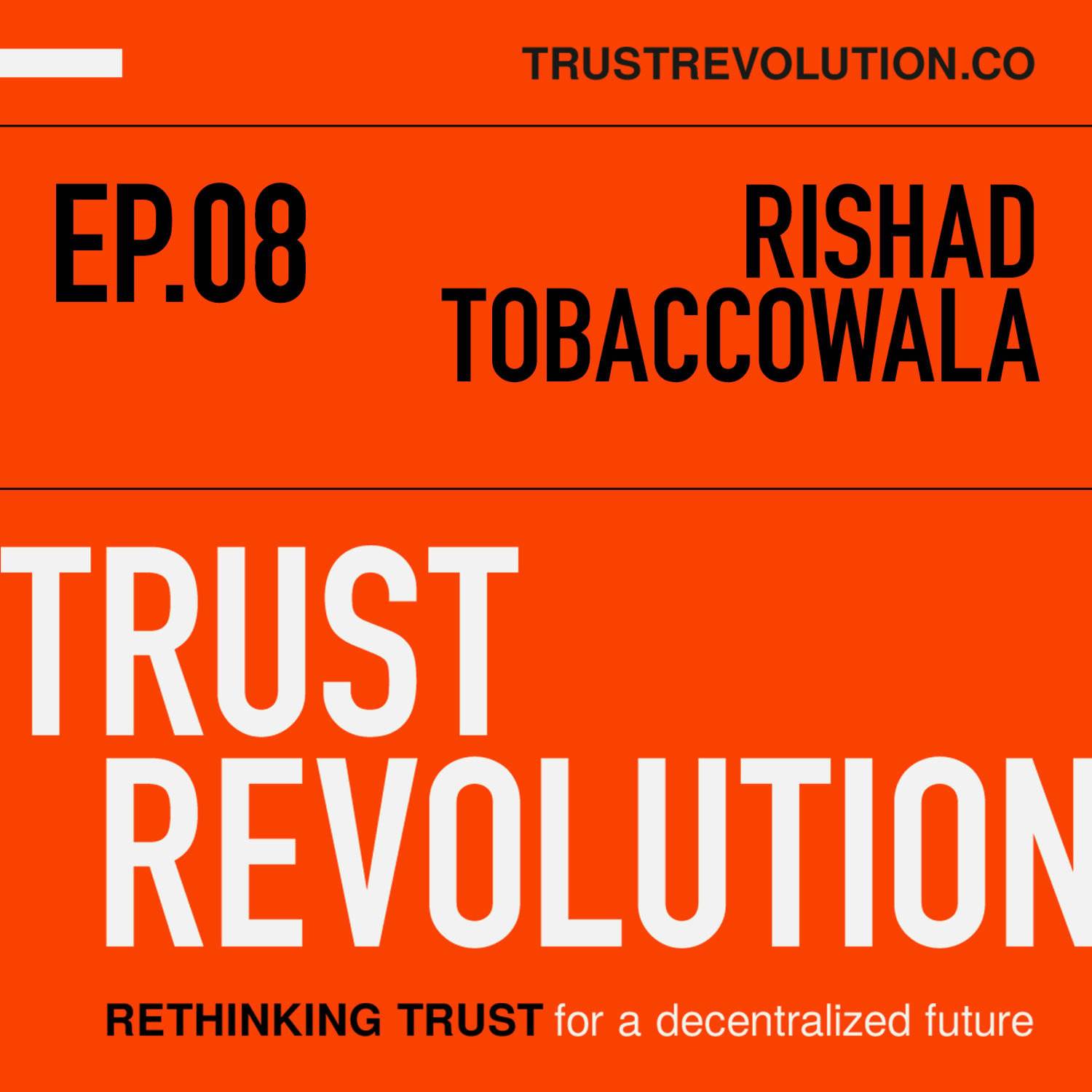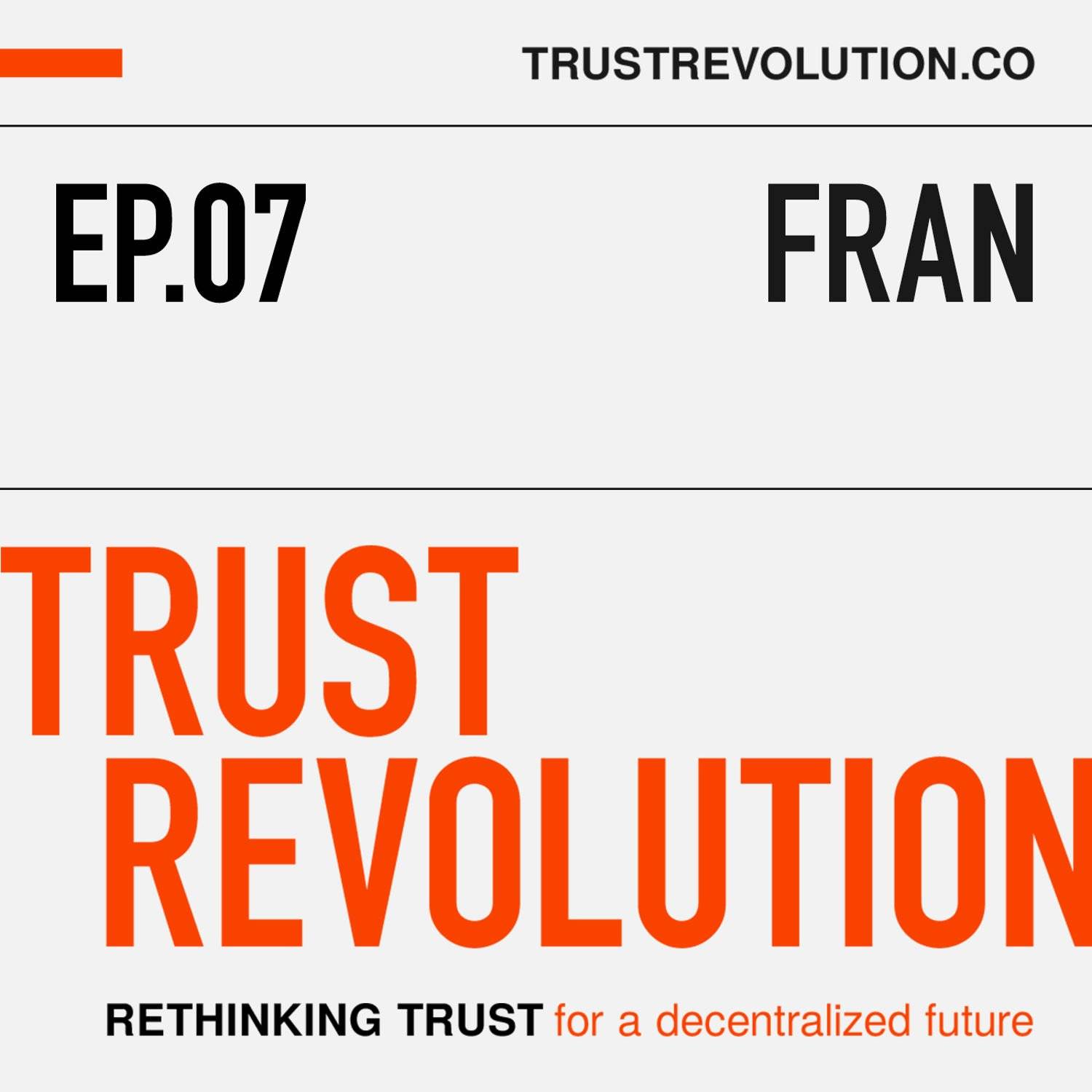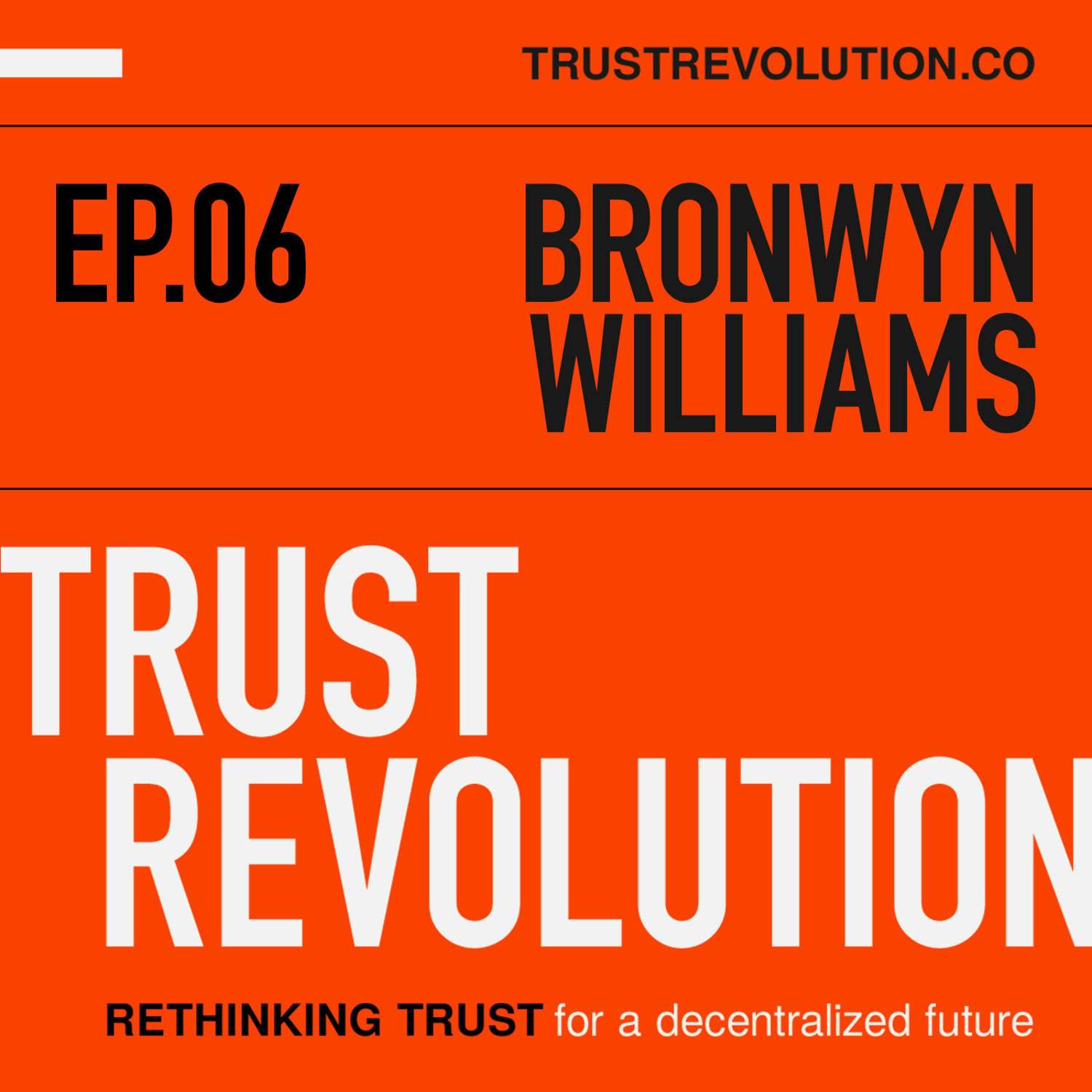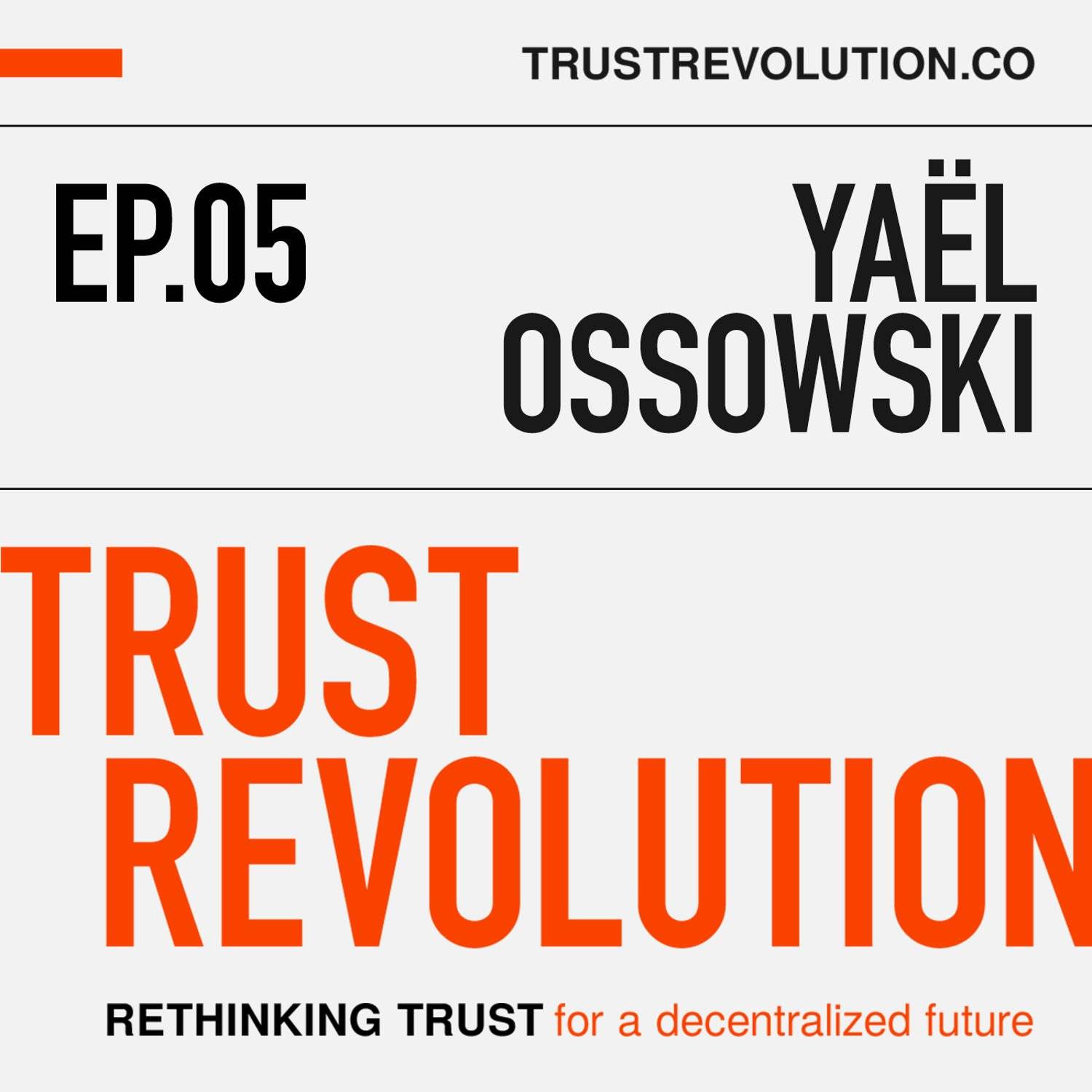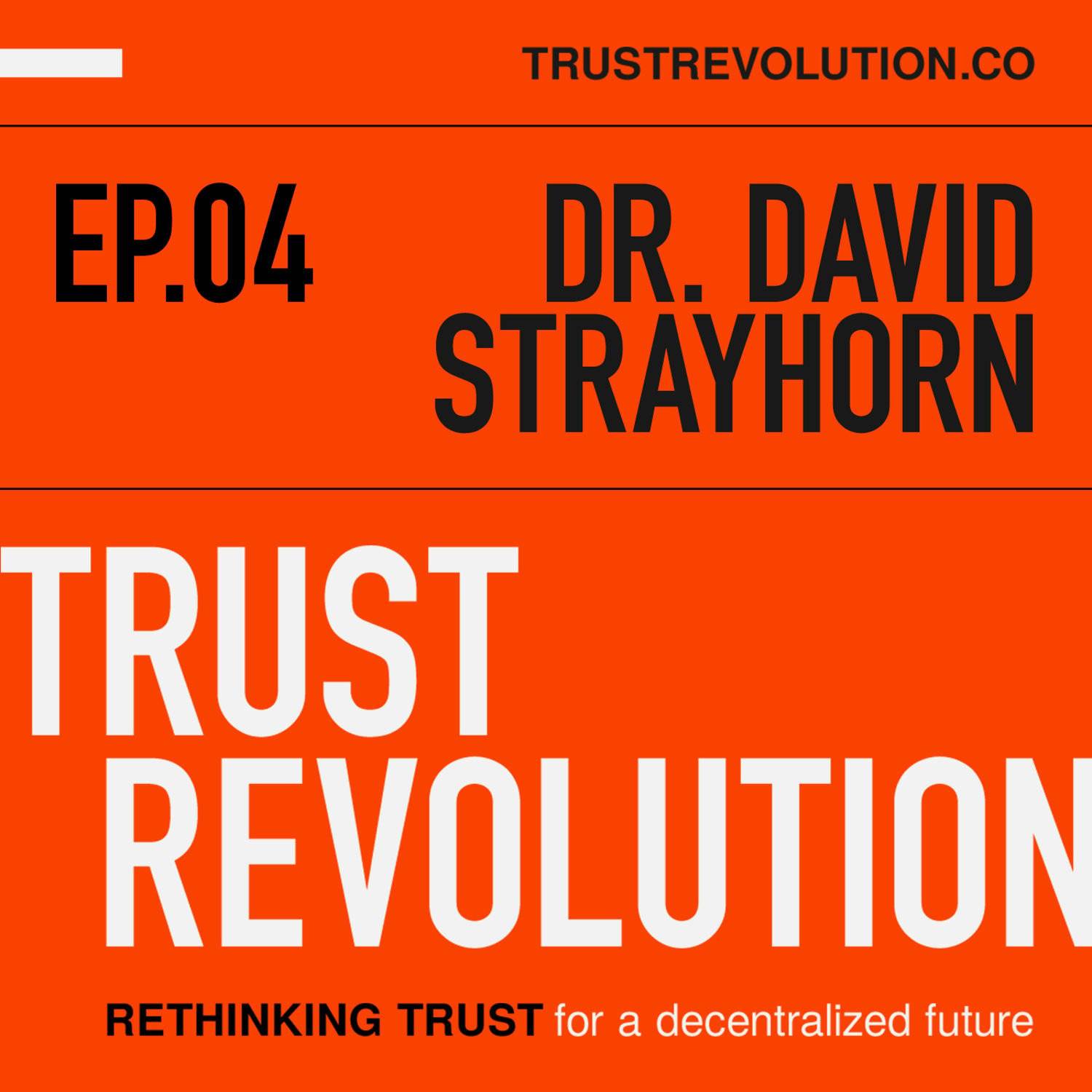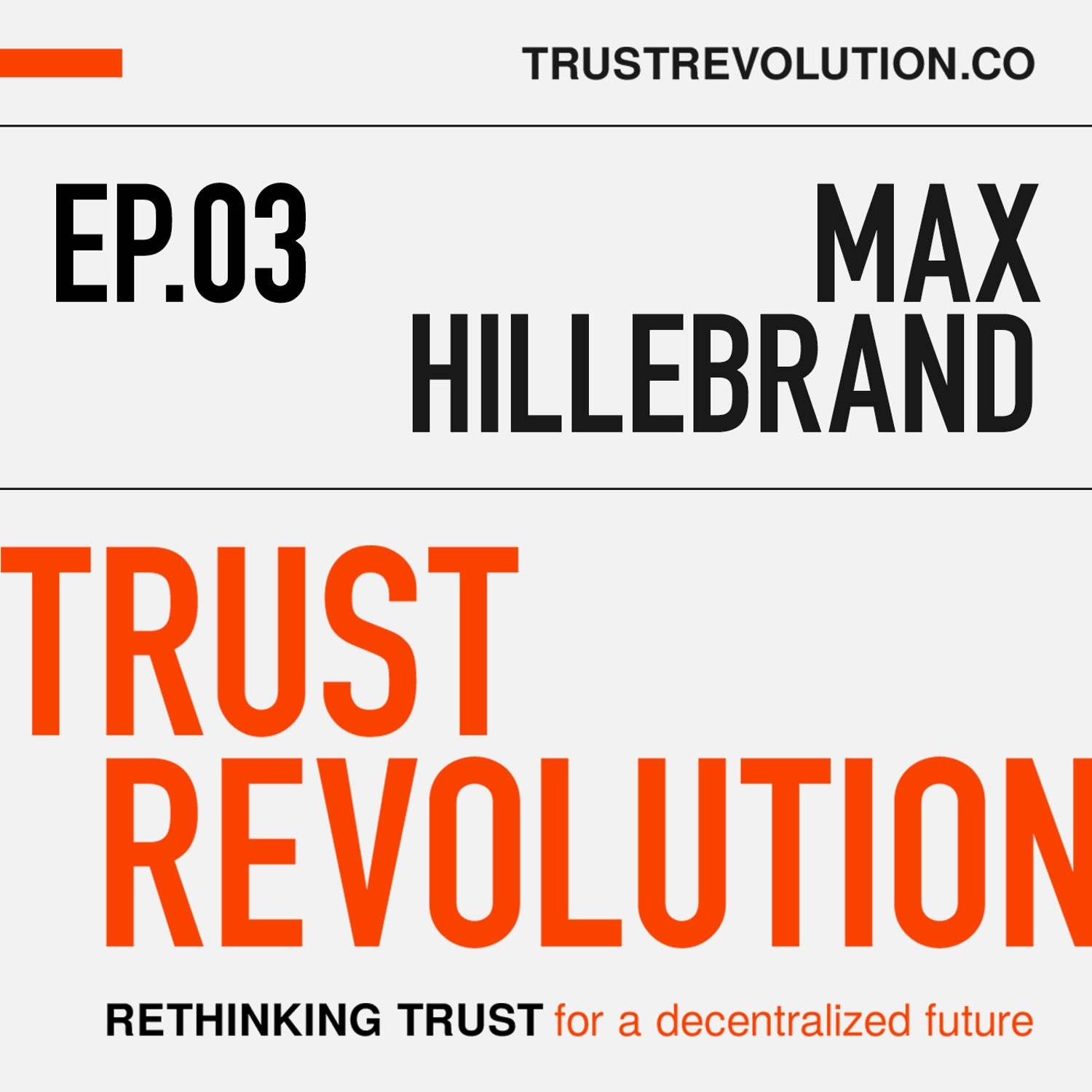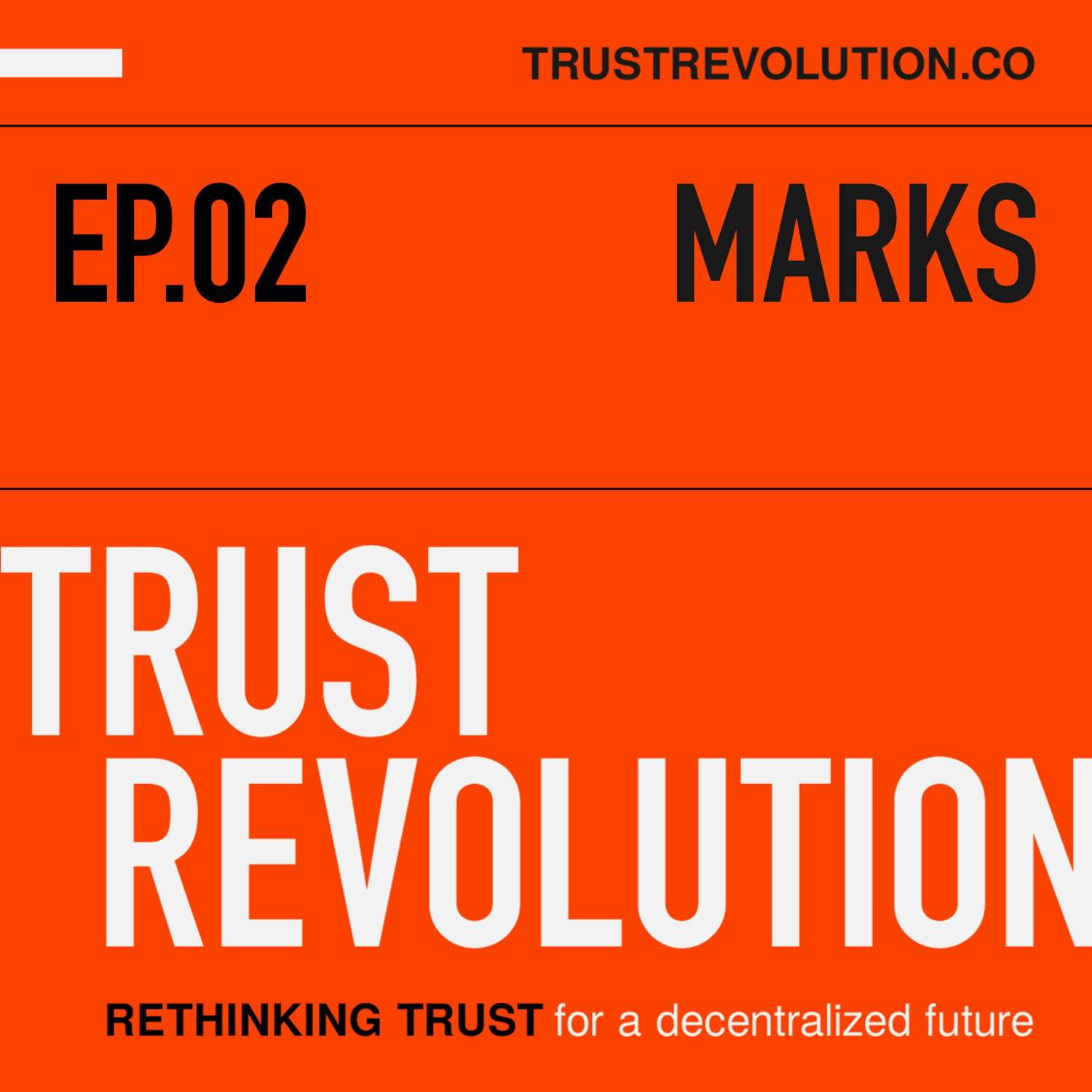Discover Trust Revolution
Trust Revolution

21 Episodes
Reverse
"If you go into a local community bank and ask for $50,000 in cash, you're going to get a lot of questions—and very likely they're going to say, 'Come back in a week, we need to order that.' The cash doesn't exist." Former Goldman Sachs risk manager Trey Sellers spent 15 years inside the machine before realizing the wealth you think you control is just a ledger entry someone else manages.
Episode Summary
Trust is breaking where it matters most: at your bank. Trey Sellers ran risk models at Truist and Goldman Sachs, managing billions in a system built on permission structures most people never question. Then Bitcoin showed him the alternative—wealth you actually own, not just exposure to. This conversation cuts through the why: institutions hold leverage through licensure and ledger control, creating money when they issue loans while your "savings" evaporates at 7% annually through inflation. Bitcoin inverts this—cryptographic ownership that requires no permission, no institution, no government blessing. Sellers walks through the Silicon Valley Bank collapse as a case study in why sovereignty matters, explaining how business owners couldn't make payroll because their cash was trapped in an insolvent bank. The path forward isn't abandoning the system overnight—it's understanding the power shift when money becomes a bearer asset you control. For executives and founders, this is strategic: Bitcoin on your balance sheet isn't speculation, it's a hedge against the trust failures already playing out in traditional finance.
About the Guest
Trey Sellers is Vice President of Sales at Unchained and author of FireBTC, a newsletter on financial independence through Bitcoin. He spent 15 years in traditional finance at Goldman Sachs and Truist (formerly BB&T), running risk models and managing institutional portfolios. After achieving financial independence in five years, he left Wall Street to focus exclusively on Bitcoin. Sellers writes weekly on how Bitcoin enables true financial sovereignty beyond traditional FIRE (Financial Independence Retire Early) frameworks. He lives with his wife and two daughters, applying low time preference principles to family wealth building.
Key Quotes
"When you take out a mortgage, there is new money that is created. It will be extinguished over time, but for a 30-year mortgage, that's 30 years of new money in the economy. You can't do that as an individual—but as a bank, you have special licensure from the state that allows you to just conjure up new money." — Trey Sellers
"What does it mean to achieve financial independence if you don't have sovereignty over the money you've saved going forward into retirement? The political environment is really weird right now, and it would make a lot of sense to at least have a little bit of a hedge there." — Trey Sellers
"Bitcoin is so much more real than the dollars you see in your bank account. Sure, you can pull out a $20 bill, but it actually just represents a spot on some amorphous ledger. When you're holding Bitcoin with private keys, it's digital but physical in the way you actually interact with it." — Trey Sellers
"If you are holding your own keys and using a financial advisor, they've got to actively ask you for their fee. It's a push, not a pull—and that keeps them in check because they have to be very nice to you and treat you well." — Trey Sellers
"Number go up technology is the number one recruiter for Bitcoin. That has always been the case. And I think that's perfectly fine—people are focused on Bitcoin for the narrow purpose of making more money. But when you take control of your personal finances and adopt Bitcoin, you take that power back." — Trey Sellers
Key Takeaways
Fractional reserve is a myth in modern banking: With unlimited Fed backstops, banks operate with infinite reserves created through printing. Bitcoin can't be conjured—scarcity creates real accountability and forces institutions to prove solvency, not promise it.
Your "cash balance" is trapped during crises: Silicon Valley Bank proved business owners couldn't access deposits to make payroll when regulators shut down the bank over a weekend. Holding Bitcoin with private keys means treasury you control 24/7, eliminating single-point-of-failure risk in banking relationships.
Information asymmetry disappears with self-custody: Traditional finance obscures fees through expense ratios and advisor arrangements that pull from your accounts. Bitcoin forces push transactions—you must actively send fees, making costs explicit and shifting negotiating leverage back to you.
Corporate treasuries are melting ice cubes: A $500 million cash balance loses 7% purchasing power annually through M2 expansion—meaning it halves in value over 10 years. Allocating even a portion to Bitcoin offsets erosion while maintaining liquidity, turning retained earnings into competitive advantage rather than shareholder value destruction.
Timestamps
[04:38] Why traditional banking is a permission structure—and what happens when you can't access your own money [07:37] The ledger illusion: How fiat currency is less real than Bitcoin despite being "tangible" [11:13] Fractional reserve banking is dead—banks now operate with infinite reserves through Fed intervention [14:28] How banks create new money through loans: The special licensure that gives institutions monetary superpowers [18:37] Why holding a Bitcoin ETF isn't sovereignty—and what financial independence actually requires [22:16] Information asymmetry and fee extraction: How custody models hide what you're really paying [28:11] Mathematical certainty vs. institutional reputation—when cryptography beats brand credibility [35:05] Silicon Valley Bank collapse decoded: Interest rate risk, balance sheet mismanagement, and payroll crises [38:46] Bitcoin treasury strategies demystified—why buying corporate shares to own Bitcoin usually underperforms [44:00] The $500 million melting ice cube: How S&P 500 companies destroy shareholder value by holding cash [47:38] From Wall Street to sovereignty: Trey's five-year path to financial independence through Bitcoin [56:14] Raising kids in a Bitcoin world—teaching autonomy when institutions demand compliance
Resources & Links
Guest Links:
Newsletter: FireBTC
X: @TreyBSellers
Company: Unchained
Episode Links:
Subscribe: https://podcast.trustrevolution.co
Show website: trustrevolution.co
Music: More Ghost Than Man
Subscribe to Trust Revolution at podcast.trustrevolution.co for weekly conversations on what's breaking trust, what's replacing it, and how to win through the transition.
What if the mind you trust is running a four-year-old's survival code?
Rob Brinded, author of Glitch: The Hidden Code Running Your Life (And How to Debug It), joins Shawn to reveal how childhood programming creates unconscious “hamster wheels” that determine who we trust, why we repeat patterns of betrayal, and how intelligent people make devastating choices. This conversation maps the five binary programs installed in early childhood that run our lives—left-siders seeking value through people-pleasing, right-siders compulsively achieving to avoid disappointment, both trapped in wheels that inevitably flip.
Rob unpacks Bitcoin as collective consciousness technology that exposes our programming, the critical role of mineral restoration in clear judgment, and the path to “admin mode”—observing your patterns without judgment until they dissolve.
Guest Background
Rob Brinded is a mind coach and author of Glitch: The Hidden Code Running Your Life (And How to Debug It). Working with elite athletes, founders, and executives, he helps clients identify and dissolve childhood programming that drives self-sabotage, addiction, and misplaced trust. Rob spent years observing behavioral patterns to map the five “hamster wheels” that create our reality. He combines Eastern philosophy, somatic observation, and Bitcoin-inspired thinking to guide clients into “admin mode”: the ability to watch and reprogram their operating systems.
Highlights
The hamster wheel framework: five binary operating systems from childhood—left-siders people-please for value, right-siders compulsively achieve to avoid disappointment, both inevitably flip
Intelligence doesn't protect you: PhDs at the Fed, David Deutsch blocking critics, Nassim Taleb's fragility—all running four-year-old survival scripts, not strategic thinking
Bitcoin as collective consciousness technology: reveals the fiat hamster wheel, forces you to question your own operating system, price triggers fear as opportunity for observation
Mineral restoration urgency: copper deficiency plus iron overload from fortified foods creating hormonal chaos, magnesium burning through under stress, lowest testosterone levels ever recorded
Admin mode practice: observe your reaction to information—that reaction is a program, not you; “everything you don't want to be like your father is within you"
Quotes to Remember
“If someone keeps getting betrayed, it's because their operating system needs that.” — Rob Brinded
“The only thing I can trust about chemtrails is that it triggers my hamster wheel.” — Rob Brinded
“We have the lowest levels of testosterone ever recorded throughout the world. Look at our system—everyone feels completely unable.” — Rob Brinded
“Know the truth. There's no forgiving.” — Rob Brinded
“You cannot trust your mind. It's not intelligent. It's just scripts.” — Rob Brinded (citing David Bohm)
Resources & Links
Glitch: The Hidden Code Running Your Life by Rob Brinded: https://www.glitchthebook.co/shop/
Rob Brinded on X: https://x.com/RobBrinded
Rob Brinded on Nostr: https://primal.net/RobBrinded
The Place to Be / Citadel Garden: https://citadel.garden/
Rob Brinded website: https://robbrinded.com
Subscribe: https://trustrevolution.co
Music in this episode by More Ghost Than Man.
September 2025 marked a critical turning point in the surveillance economy. Disney paid $10 million for illegally collecting children's data. Google faced $425.7 million in penalties for nearly a decade of smartphone tracking. Microsoft cut off a military unit for using their tools to surveil civilians. While corporations face mounting fines and compliance nightmares, governments worldwide are accelerating digital ID mandates—offering a false choice between corporate surveillance and state control. From cryptographic proofs to peer-to-peer networks, the alternatives exist right now. The question is whether we'll adopt them before the surveillance trap closes.
Key Highlights
The September 2025 Reckoning: Major enforcement actions against Disney ($10M), Google ($425.7M), and others signal the surveillance economy's breaking point
The Digital ID Trap: How governments worldwide are using corporate surveillance failures to justify centralized identity systems
The False Binary: You're being offered corporate surveillance OR government control—but cryptographic alternatives eliminate both
The Compression Effect: Privacy regulations squeeze corporations while governments offer their surveillance infrastructure as "relief"
19 Episodes of Solutions: How every Trust Revolution guest has been showing us privacy-by-design alternatives that actually work
The Personal Playbook: Five concrete actions you can take this week to reduce surveillance exposure and resist digital ID adoption
The Fork in the Road: Why your individual choices in the next 6-12 months will determine whether surveillance infrastructure succeeds
Resources
Privacy-Preserving Communication Tools
Signal - End-to-end encrypted messaging with no metadata collection
SimpleX Chat - Anonymous messaging with no phone number or identifier required
Nostr - Censorship-resistant communication protocol
Tor Browser - Anonymous web browsing
Privacy-Focused Browsers & Search
Brave Browser - Privacy-first browser with built-in tracker blocking
Firefox - Open-source browser with strong privacy extensions
DuckDuckGo - Search engine with no tracking or profiling
Brave Search - Independent search with no user profiling
Financial Privacy & Sovereignty
Bitcoin - Decentralized, permissionless digital money
Lightning Network - Fast, private Bitcoin transactions
Your Action Items This Week
Delete one surveillance app - Replace it with a privacy-respecting alternative
Learn about one privacy-preserving technology - Zero-knowledge proofs, Bitcoin, Nostr, or secure enclaves
Have one conversation about digital IDs - Make someone aware of what's coming
Resist one unnecessary data request - Don't give information websites don't actually need
Subscribe to Trust Revolution - Stay informed as we continue covering alternatives
This week we feature the “Open Communities in the Age of Control” panel, recorded live on September 20th at the Imagine IF conference in Nashville. The discussion dives into the erosion of trust in a digital age dominated by surveillance, opaque algorithms, and centralized platforms.
Trust Revolution host Shawn Yeager joins Matt Odell and Derek Ross to explore how broken incentives turn users into products, with censorship and deep fakes threatening livelihoods and verifiability. They advocate for open, user-controlled communities via protocols like Nostr, emphasizing personal responsibility, parental tools, and creator-owned ecosystems to reclaim digital sovereignty.
Highlights
Shawn diagnoses broken money as the root of exploitative business models and creeping KYC regulations.
Matt reveals how censorship can erase years of online work, pushing for user-controlled algorithms.
Derek highlights deepfakes and the need for verifiable identity in the AI era.
The panel discusses Nostr’s potential to empower individuals, with Shawn recommending Primal as an entry point.
Parental control and kid-safe Nostr apps are proposed to combat radicalization and unhealthy tech use.
Quotes to Remember
Shawn Yeager: “With broken money come broken incentives, and from that flow business models that turn us into the product.”
Matt Odell: “Years of hard work can be taken away because you built your digital life on somebody else’s foundation.”
Derek Ross: “We need easy tools for parents to choose how their kids are interacting with these things.”
Resources and Links
Primal.net - User-friendly Nostr client recommended by Shawn.
Soapbox Tools - Derek Ross’s platform for creator-owned apps.
Imagine IF - A two-day convergence of dreamers and doers
Subscribe at Trust Revolution.
Centralized systems—Big Pharma, globalist agendas, government education—are crumbling under their own weight, leaving trust in tatters. Alex Newman, investigative journalist and CEO of Liberty Sentinel Media, joins Shawn to rip the veil off these failures. With 2025 exposés on digital IDs, vaccine mandates, and institutional overreach, Newman reveals how entities like the WEF and UN erode sovereignty. This Trust Revolution episode delivers a raw dissection of power grabs and practical, decentralized strategies to reclaim control, urging listeners to question narratives and act.
Guest Bio
Alex Newman is an award-winning journalist, author, and CEO of Liberty Sentinel Media. With a B.S. in Journalism from the University of Florida and global experience, he’s written bestsellers like Indoctrinating Our Children to Death and Deep State: The Invisible Government Behind the Scenes. Newman exposes centralized power undermining sovereignty, advocating self-reliant, privacy-first solutions. His 2025 work, including The Sentinel Report and X posts, tackles digital IDs and Big Pharma corruption.
Highlights
Big Pharma’s Erosion of Confidence: Newman unpacks vaccine mandate fallout, drawing from his 2025 Dr. Robert Malone interview, and suggests decentralized health solutions.
Digital IDs as Control Tools: UK proposals tied to migration expose surveillance risks; Newman offers privacy-first countermeasures (X, Sep 9, 2025).
Education’s Centralized Overreach: Policies tying funding to curricula alienate families; community-driven learning is a path forward.
Whistleblowers Driving Change: Dr. Kirk Moore’s case and Trump’s Warp Speed reflections show how exposure sparks critical thinking (Rumble, Sep 2025).
Individual Empowerment: Newman shares steps to navigate globalist agendas with autonomy and skepticism, avoiding institutional traps.
Actionable Takeaways
Scrutinize Dependencies: Identify reliance on centralized systems (healthcare, education) and explore alternatives.
Prioritize Privacy Tools: Adopt secure platforms to protect data from surveillance, like digital IDs.
Build Local Networks: Create community-based systems for learning and resource sharing to reduce institutional control.
Question Narratives: Use evidence-based skepticism to evaluate institutional claims and maintain autonomy.
Books:
Indoctrinating Our Children to Death (2024).
Deep State: The Invisible Government Behind the Scenes (2018).
Connect
Guest: Liberty Sentinel Media | @ALEXNEWMAN_JOU | The Sentinel Report
Host: shawnyeager.com | @shawn
Subscribe: trustrevolution.co
Music in this episode by More Ghost Than Man.
Jeffrey Tucker, founder of the Brownstone Institute and Austrian economics advocate, joins Shawn to dissect the COVID-19 response's devastating impact on institutional trust and explore paths to personal sovereignty. This conversation unveils how the pandemic revealed the “total state” pervading all aspects of society, why libertarian institutions failed during the crisis, and how Austrian economics principles point toward reclaiming individual freedom through timeless values and critical thinking.
Guest Background
Jeffrey Tucker is the founder and president of the Brownstone Institute, established in 2021 as a response to COVID-19 policies. He's authored numerous books, including his latest, Spirits of America: On the Semiquincentennial, inspired by Eric Sloan's The Spirit of '76. A prolific writer with 1,000+ articles, Tucker has been a leading voice against pandemic restrictions and institutional overreach. His work spans economics, technology, and individual liberty, with a focus on practical philosophy for modern life.
Highlights
Tucker's 2005 warnings about pandemic planning and his isolation as a lone voice against lockdowns
How China scripted the global lockdown response and Western institutions' compliance
Austrian economics explains how negative interest rates created the bloated managerial class
The “total state” revelation: regulatory capture extending throughout corporations, media, and academia
Brownstone Institute's mission to “outwit their experts” with intellectual accountability
Personal sovereignty through reclaiming time, finding joy in routine, and mastering your domain
Quotes to Remember
“I was outraged when I saw what was happening. I had been writing about pandemic planning issues since about 2005 because I saw that there was a sector within government that imagined that the way to deal with infectious disease was by nationalizing everything.”
“We experienced negative interest rates for two decades. And you know from Austrian production theory that under those conditions, what you get is a wildly blown up, overblown capital goods sector that's living off leverage.”
“We need to reclaim our freedom by first reclaiming our time and the use of our time, the use of our personal space, and reclaiming our brains from those people who have stolen them from us.”
Resources & Links
Spirits of America by Jeffrey Tucker: https://www.amazon.com/Spirits-America-Semiquincentennial-Jeffrey-Tucker/dp/1630693014/
Brownstone Institute: https://brownstone.org/
The Great Barrington Declaration: https://gbdeclaration.org/
Jeffrey Tucker's articles at Epoch Times: https://www.theepochtimes.com/author-jeffrey-tucker
Austrian Economics Center: https://www.austriancenter.com/
Jeffrey Tucker on Twitter/X: @jeffreyatucker
Subscribe: https://trustrevolution.co
Music in this episode by More Ghost Than Man.
In This Episode
Shawn interviews Mathias Buus, CEO of Holepunch, about revolutionizing the internet with peer-to-peer (P2P) technologies like Pear Runtime, Hypercore, and Keet. Mathias shares his journey from math student to open-source powerhouse with over 1,000 NPM modules, driven by empowering individuals. They discuss centralized platforms’ flaws, Keet’s open-source controversy, and how businesses can adopt P2P for a trustless future.
Guest Bio
Mathias Buus, Holepunch’s CEO, is a Copenhagen-based JavaScript wizard who’s published over 1,000 NPM modules with billions of downloads. Creator of Pear Runtime, Hypercore, and Keet, he organized the 2025 P2P Summit to rally developers against Big Tech’s grip. His mission: empower individuals with trustless, decentralized systems.
Highlights
Mathias’s background: From university math’s humbling lessons to prolific open-source contributions, emphasizing individual empowerment through code.
Origins of Holepunch: Inspired by BitTorrent’s resilience, Mathias generalized P2P for any data, removing infrastructure barriers for app building.
Centralization flaws: P2P targets data control, censorship, and erosion of sovereignty by platforms like Meta, Google, and X.
Keet controversy: Partial open-sourcing raises verifiability concerns; Mathias defends modular approach but acknowledges community demands.
Future vision: A world of borderless, sovereign communication via owned devices; businesses should deprogram centralization and experiment with P2P.
Practical steps: Start with hybrid models, join Keet communities for collaboration, and focus on sustainable decentralized business models.
Quotes to Remember
“I'm very driven by the power of the individual… What can I do as a person myself to make an impact on my surroundings?” – Mathias Buus
“How do you stop a population that has financial and communication independence?” – Mathias Buus on P2P sovereignty
“You need to learn how to deprogram… Start thinking these crazy things like, what if we just didn't have servers?” – Mathias Buus on adopting P2P
Resources & Links
Holepunch Official Website -https://company.holepunch.to - Overview of P2P technologies and company mission.
Keet App Download - https://keet.io - Get the P2P chat app and explore its communities.
P2P Summit 2025 Recap - https://company.holepunch.to/summit-2025 - Insights from Mathias’s developer event.
Mathias Buus’s GitHub Profile - https://github.com/mafintosh - View his extensive open-source contributions.
Mathias Buus’s X Profile - https://x.com/mafintosh - Follow for updates on P2P development.
Shawn Yeager kicks off Season 2 of Trust Revolution with Nick Anthony, policy analyst at the Cato Institute’s Center for Monetary and Financial Alternatives and fellow at the Human Rights Foundation, leading their CBDC Tracker. They dive into the escalating risks of central bank digital currencies (CBDCs), which supercharge government surveillance beyond laws like the Bank Secrecy Act. Nick, author of Digital Currency or Digital Control, traces the 2019 CBDC surge to Facebook’s Libra and flags authoritarian regimes as frontrunners. Learn why financial privacy hangs by a thread and how Bitcoin could be the lifeline.
Guest
Nick Anthony serves as a policy analyst at the Cato Institute’s Center for Monetary and Financial Alternatives and a fellow at the Human Rights Foundation, where he leads the global CBDC Tracker. He monitors the implications of central bank digital currencies across 139 jurisdictions. As the author of Digital Currency or Digital Control: Decoding Central Bank Digital Currency and the Future of Money, he focuses on dissecting the threats posed by centralized financial systems, advocating for decentralized alternatives like Bitcoin to protect individual privacy and freedom.
Highlights
Season 2 & Fountain.fm Launch (00:00): Shawn unveils Season 2, shifting to Fountain.fm for independent, ad-free distribution. Support via Bitcoin or fiat at trustrevolution.co.
Nick’s Intro via Nostr (01:31): Shawn welcomes Nick, connected via Nostr, spotlighting his Cato role, CBDC Tracker, and book Digital Currency or Digital Control.
Cato’s 2014 Mission (03:27): Nick details the Center’s start to challenge central banking post-2008, exploring Bitcoin and fintech alternatives.
Public’s Financial Woes (08:51): Nick highlights confusion over inflation and government chaos, sparking CBDC curiosity.
Authoritarian Edge (14:36): Nick reveals seven of ten CBDC nations are autocracies, using them for control.
Quotes to Remember
“Having conversations about [CBDCs] is so important… if [people] don’t know, then it’s just going to happen without our say.” – Nick Anthony
“I want people to use alternatives because they’re better, because they’re running to them, not because they’re running away from something.” – Nick Anthony
“The state is objecting to this… planting in the ground that the state is protesting.” – Nick Anthony
“Activity is accelerating, but interest is waning… the allure across the world is fading.” – Nick Anthony
Resources & Links
Nick Anthony’s book: Digital Currency or Digital Control
Cato Institute’s Center for Monetary and Financial Alternatives: cato.org/centers/cmfa
Human Rights Foundation CBDC Tracker: hrf.org/cbdc-tracker
Nick Anthony on X: @Nick-C-Anthony
Nick Anthony on Nostr
Subscribe at trustrevolution.co.
Music in this episode by More Ghost Than Man.
In this solo episode, Shawn reflects on the first 12 episodes of Trust Revolution, expressing gratitude to listeners and sharing insights gained from conversations with various builders, thinkers, and leaders. The podcast aims to explore the erosion of trust in traditional institutions and the potential of decentralization and technology, such as Bitcoin, to restore personal sovereignty. Shawn discusses the importance of reaching those curious about alternative systems and highlights key themes like the diminishing trust in centralized entities and the promise of decentralized solutions.
Throughout the season, Shawn engaged with a diverse group of guests, including futurists, technologists, and policy advisors, to discuss topics ranging from private AI and alternative app stores to the implications of AI on society. He emphasizes the need for citizen action and transparency to challenge existing power structures and the role of technology in reshaping business and governance.
As the podcast moves forward, we'll focus on conversations with builders and advocates who are leading the way in creating change and empowering individuals to reclaim control over their trust and privacy.
Subscribe at podcast.trustrevolution.co.
Music in this episode by More Ghost Than Man.
OpnState, a pseudonymous civil servant and former corporate banker, joins Shawn to expose the hidden mechanisms of global financial standards and their impact on trust and sovereignty. From his role drafting anti-money laundering (AML) legislation, OpnState reveals how the Financial Action Task Force (FATF) enforces KYC and AML rules, centralizing power and eroding individual rights. He discusses the challenges of reforming a surveillance-heavy system, the power of citizen action through Freedom of Information (FOI) requests, and the hope offered by cypherpunk innovations like Bitcoin. Recorded June 16, 2025, amid growing global tensions, this episode examines why transparency matters, what’s at stake in 2025, and how individuals can reclaim agency in a trust-minimized future.
Background
OpnState is a pseudonymous policy and legislation advisor in a jurisdiction with a major financial sector. Formerly a corporate banker managing million-dollar accounts, he grew disillusioned with a financial system rigged to enrich elites. Now, as a civil servant, he’s drafted over a dozen pieces of AML legislation, giving him an insider’s view of the FATF’s global standards. Through podcasts and posts on Nostr, OpnState critiques centralized control while advocating for transparency and decentralized governance. His pseudonym allows him to speak freely about the erosion of sovereignty and the need for citizen engagement.
Highlights
FATF’s Global Control: The Financial Action Task Force sets AML and KYC standards, pressuring countries into compliance through mutual evaluations and gray-listing, undermining national sovereignty.
Erosion of Rights: AML/KYC rules bypass due process, enabling extrajudicial asset freezes and surveillance, a slow erosion of ancestral rights like property and privacy.
Misaligned Incentives: Civil servants prioritize private-sector prospects and perks over public good, necessitating new incentives like GDP-linked bonuses.
Bitcoin’s Disruption: Cypherpunk innovations like Bitcoin challenge centralized finance, though integration into traditional systems risks co-option by FATF’s focus on “unhosted wallets.”
Citizen Power: FOI requests and policy consultation participation can hold governments accountable, with transparency as the key to curbing criminal activity.
Decentralized Governance: OpnState’s paper on decentralized regulatory frameworks, inspired by game theory, and Taiwan’s POLIS platform offer paths to transparent governance.
Quotes to Remember
“The government knows everything about you, and you know so little about them. That’s not democracy—that’s a high probability of tyranny.” — OpnState
“Transparency kills all criminal activity. Cockroaches love to hide from the light.” — OpnState
“Send an FOI request. It’s free, it’s easy, and it scares the bejesus out of civil servants.” — OpnState
“Bitcoin negates the old system by creating something better, not by reforming from within.” — OpnState
“The incentives are all wrong. Civil servants chase private-sector deals, not citizen prosperity.” — OpnState
Resources & Links
OpnState’s on nostr: Follow his insights on global financial standards and sovereignty.
OpnState's "inside the government" thread: chronicling his day-to-day observations as a government regulatory policy analyst.
Matt O'dell, Bitcoin OG and freedom tech advocate, joins Shawn to dissect trust in a world of surveillance and centralized control. From Bitcoin’s role as a beacon of financial agency to Signal's strides in secure communication, O'dell unpacks the tools reshaping money, identity, and expression. As co-founder of Bitcoin Park, OpenSats, and Ten31 Ventures, and host of Rabbit Hole Recap and Citadel Dispatch, he shares a decade of insights on building privacy-first businesses and communities. Recorded June 16, 2025, amid global tensions, this episode explores why open protocols matter, what’s thriving in 2025, and how to navigate a trust-minimized future.
Background
Matt O'dell is a veteran Bitcoiner and open-source advocate, driving freedom tech forward. He co-founded Bitcoin Park, OpenSats, a 501c3 funding open-source projects like nostr and Tor, and Ten31, a VC firm backing Bitcoin businesses like Strike and Start9. Hosting Rabbit Hole Recap with Marty Bent and Citadel Dispatch, O'dell educates thousands on Bitcoin and privacy. A former Human Rights Foundation volunteer and Bitcoin Policy Institute board member, he champions self-custody and financial freedom, blending technology, policy, and community to counter surveillance.
Highlights
Bitcoin’s Evolution: From a pre-Mt. Gox Wild West to 2025’s robust self-custody and mobile apps, Bitcoin empowers users, though KYC/AML normalizes surveillance.
Freedom Tech Wins: Signal’s nonprofit model balances privacy and usability, while Tor persists despite vulnerabilities. Both lag Bitcoin’s anti-hegemonic design.
OpenSats Mission: Funds open-source projects transparently, countering corporate capture, with support for Tor and Bitcoin-focused initiatives.
Ten31 Ventures: Backs profitable Bitcoin businesses like Strike (fiat-Bitcoin bridge) and Start9 (self-hosting), balancing short-term gains with long-term freedom.
Nostr’s Promise: Solves identity and social media challenges with permissionless, trust-minimized communication, countering deep fakes and censorship.
Business Models: Buy/sell Bitcoin and collateralized loans dominate, but lean, open-source ventures like Primal and Peach bet on future demand. Tether’s $24B profit underscores fiat arbitrage, yet Bitcoin’s scarcity prevails long-term.
Quotes to Remember
“Bitcoin became this avenue of hope for me. It was a direction that we could actually affect actionable change and have true agency.” – Matt O'dell
“The power of these projects relies on individuals. It’s a movement of people.” – Matt O'dell
“Winning is 5% or higher of the global population using these tools in a freedom-focused way.” – Matt O'dell
“The tools exist for people to take agency. It’s better spent improving the lives of those who seek it than convincing the masses.” – Matt O'dell
“Bitcoin is the opportunity cost. You need to be profitable in Bitcoin terms.” – Matt O'dell
Resources & Links
Human Rights Foundation Financial Freedom Report: hrf.org/financialfreedomreport – Weekly insights on global financial repression and freedom tech’s impact.
Odell’s Resource Page: odell.xyz – Tools, contacts, and guides for Bitcoin and privacy tech.
Rabbit Hole Recap: rhr.tv – Weekly Bitcoin news with Odell and Marty Bent.
Citadel Dispatch: citadeldispatch.com – Ma…
Stephen Pollock, SVP of Development at the Bitcoin Policy Institute (BPI), joins Shawn to explore Bitcoin’s growing role in U.S. policy and statecraft. This discussion covers BPI’s mission to educate policymakers, the challenges of Washington’s political landscape, and the push for Bitcoin as a tool for freedom and national interest, including the Strategic Bitcoin Reserve.
Background
Stephen Pollock, Senior Vice President of Development at the Bitcoin Policy Institute (BPI), a 501(c)(3) nonprofit think tank co-founded by Grant McCarty and David Zell, drives the organization’s operational and advocacy efforts. As BPI’s first hire, he’s been key in building its influence in Washington, DC. With over a decade in political campaigns, public affairs, and FinTech, Pollock has shaped legislation through grassroots strategies and built networks with political and business leaders. A passionate Bitcoiner from Nashville, he bridges Bitcoin’s decentralized ethos with policy, championing self-custody and financial freedom through events like the Bitcoin Policy Summit.
Highlights
BPI’s Mission: Founded to ensure policymakers take Bitcoin seriously, BPI builds credibility through white papers, 30+ expert fellows, and a new DC office, framing Bitcoin as freedom money, not a threat.
Washington Challenges: Bitcoin faces an education gap and political football dynamics in DC. BPI counters with research and hires like Ken Egan (ex-CIA) and Axe Shapiro for advocacy.
Strategic Bitcoin Reserve (SBR): BPI’s advocacy led to an SBR via executive order, needing codification through Senator Lummis’ Bitcoin Act, though stablecoin bills currently compete for attention.
Statecraft Shift: Bitcoin is seen as a statecraft tool, with the CIA’s Deputy Director speaking at BPI’s summit, signaling a subtle shift in perspective.
Bitcoin Conference Milestone: The Vice President’s 2025 speech praised Bitcoin as a hedge against inflation and control, with JD Vance as a potential future champion.
Five-Year Vision: BPI seeks to codify self-custody and regulatory clarity via the Bitcoin Act, build bipartisan support, and elevate Bitcoin to a nonpartisan asset like the internet, reducing risks like a 6102-style seizure.
Quotes to Remember
“There's no CEO of Bitcoin… that creates vacuums unless someone steps up.”
“Memorize 12 words, take your life savings anywhere.”
“The worst thing is Bitcoin reaching government with nobody knowing what it is.”
“I don’t need an elected official to be a Bitcoiner, just to take it seriously.”
“Bitcoin is one of the most powerful human rights tools we have.”
Resources & Links
Bitcoin Policy Summit: June 25, 2025, Washington, DC. Features CIA’s Michael Ellis, Hester Pierce, and lawmakers at btcpolicysummit.org.
BPI Website: Explore research and advocacy at btcpolicy.org.
Subscribe at podcast.trustrevolution.co. Music in this episode by More Ghost Than Man.
In this episode, Shawn sits down with a legendary figure from the early days of digital culture, R.U. Sirius, exploring the radical roots and transformative potential of the Internet. Our guest shares insights from his experience with pioneering publications like Mondo 2000, reflecting on the early ideals of user empowerment and decentralization. We delve into the evolution of the Internet from a space of individual freedom to one dominated by corporate interests, discussing the shifts in power dynamics and the impact of commercialization on the digital landscape. With a mix of optimism and caution, this episode offers a thought-provoking look at the past, present, and future of digital culture and individual agency.
About RU Sirius
RU Sirius is a writer, musician, and counterculture pioneer who co-founded Mondo 2000, the 1980s–1990s magazine that shaped cyberpunk and tech optimism. A “left-libertarian” influenced by transhumanists Timothy Leary and Robert Anton Wilson, he’s explored technology’s liberating potential for decades. Based in San Francisco, RU writes for Mindplex.ai on AI and creativity, performs as The Smarter Kings of Delirium, and is co-authoring a Mondo 2000 history with Shira Chess for Strange Attractor Press.
Quotes to Remember
“The original ideal was that everything on the internet can be easily copied and shared… it won’t be controlled and it won’t be monetized.” — RU Sirius
“Competition was going to put more power into the hands of the hosts, the sites, and less into the hands of the participants.” — RU Sirius
“If Mondo 2000 had one message, it was be like Laurie Anderson… use the tools as creatively as is possible.” — RU Sirius
“Leaning into friendship can be a good thing to start doing [in a trolling world].” — RU Sirius
Resources & Links
Mondo 2000 Archives: Explore cyberculture’s roots with digital scans at archive.org. https://archive.org/details/mondo2000magazine
Mindplex.ai Articles: Read RU’s takes on AI and creativity at Mindplex.ai. https://magazine.mindplex.ai/search/R.U. Sirius
Strange Attractor Press: Learn about RU’s forthcoming Mondo 2000 book. https://www.mondo2000.com/freaks-in-the-machine-mondo-2000-in-late-20th-century-tech-culture/
RU Sirius on X: Follow RU for updates on his work and events. https://x.com/2000_mondo
Subscribe: https://podcast.trustrevolution.co
Music in this episode by More Ghost Than Man: https://moreghostthanman.bandcamp.com/
Rishad Tobaccowala, futurist and author of Rethinking Work, joins Shawn to unravel the dynamics of power, talent, and trust in a decentralized, AI-driven future. This conversation exposes the seismic shifts dismantling traditional jobs, the rise of talent over capital, and why trust—rooted in truth and integrity—is the ultimate currency for brands and leaders. From technology’s promise to demographic realities, Rishad delivers a wake-up call for navigating the unbundled world of work.
Background
Rishad Tobaccowala, a global strategist, spearheaded digital transformation at Publicis Groupe for 37 years. Now a speaker, advisor, and author of Rethinking Work and Restoring the Soul of Business, he guides leaders on technology and human values. His Substack, with 30,000+ subscribers including global CxOs, offers sharp insights. Key lessons from his work include decentralizing work, empowering talent over capital, and building trust through integrity in an AI age.
Highlights
Peak Jobs Are Over: By 2030, U.S. jobs could drop by a third due to automation, but work will explode outside traditional roles, driven by a 1.6 fertility rate and technologies like AI and blockchain.
Five Forces Unbundling Work: Societal/demographic shifts, technology (AI, blockchain, XR), marketplaces (Upwork, Etsy), gig work, and COVID’s redefinition of purpose decentralize work.
Trust as Currency: AI becomes table stakes; trust, built on integrity (aligned words, beliefs, actions, and truth), sets brands and leaders apart.
Talent Trumps Capital: Technology empowers individuals to own content and data via platforms like Substack and blockchain, shifting power to “companies of one.”
2027 Ecosystem: A “whales” (e.g., NVIDIA) and “plankton” (small firms) model emerges, with fewer employees and AI-driven strategies.
Quotes to Remember
“We’ve seen peak jobs… by the end of this decade, we will have maybe a third fewer jobs than currently exist.”
“Trust is what somebody earns… integrity is when what you say, what you believe, and what you do are completely aligned. And is it true?”
“Technology is the leverage that allows David to bring down Goliath. Power is moving to talent over capital.”
“The future is already here, but it’s not evenly distributed… Talent is evenly distributed, but opportunity is not.” (paraphrasing William Gibson)
Resources & Links
Rethinking Work by Rishad Tobaccowala (HarperCollins): https://www.harpercollins.com/products/rethinking-work-rishad-tobaccowala
Restoring the Soul of Business by Rishad Tobaccowala (HarperCollins): https://www.harpercollins.com/products/restoring-the-soul-of-business-rishad-tobaccowala
Rishad Tobaccowala’s Substack: https://rishad.substack.com
Rishad on LinkedIn: https://www.linkedin.com/in/rishadtobaccowala/
Rishad’s website: https://rishadtobaccowala.com/
Subscribe: https://podcast.trustrevolution.co
Music in this episode by More Ghost Than Man.
In this Trust Revolution episode, Shawn Yeager and Fran, the Buenos Aires-based creator of Zapstore, explore the chokehold of centralized app stores. Fran details how Apple and Google’s control stifles innovation and erodes trust, then unveils Zapstore, a Nostr-powered, decentralized solution with cryptographic security and social trust layers. This 65-minute conversation spans the frustrations of arbitrary curation to the promise of AI-driven “vibe-coded” apps, showing how decentralized systems can reclaim power for users and developers.
About Fran
Fran is a full-stack software engineer with nearly two decades of experience, from Java in the 2000s to modern mobile frameworks. Based in Buenos Aires, Argentina, he’s the creator of Zapstore, a decentralized app store launched in May 2024 on the Nostr protocol. Driven by frustration with centralized app stores’ control, Fran’s work empowers users and developers with secure, censorship-resistant software distribution. A participant in the first Sovereign Engineering cohort in Madeira, he’s a vocal advocate for privacy and autonomy, blending technical expertise with a vision for a freer digital ecosystem.
X Profile: @FranOnNostr
Nostr: fran@primal.net
Zapstore: Zapstore
Quotes to Remember
“The biggest problem is we can’t change the curator, and that creates resentment on both sides.” — Fran
“With centralized stores, the filters feel random, like they’re just flexing power.” — Fran
“ZapStore uses Nostr to sign apps, so you know they’re from the developer, not some middleman.” — Fran
“A free market of catalogs means no one can misbehave without losing trust.” — Fran
“In the future, AI will let anyone vibe-code apps, breaking the app store monopoly.” — Fran
Resources & Links
Zapstore Website: Discover Zapstore’s decentralized app store for Android and explore its mission to empower users. Zapstore
Nostr Protocol: Learn about the decentralized protocol behind ZapStore’s censorship-resistant app distribution. nostr.com
Fran’s Blog Post: Read Fran’s detailed analysis of centralized app store flaws and Nostr’s potential to fix app distribution. Zapstore/blog
Subscribe: https://podcast.trustrevolution.co
Music in this episode by More Ghost Than Man.
In this hard-hitting episode of Trust Revolution, Shawn sits down with Bronwyn Williams, a South African futurist and economist, to dissect the collapse of trust in centralized systems. Bronwyn analyzes how globalization and technology challenge institutional credibility, using South Africa’s governance struggles as a backdrop. She critiques AI’s centralizing risks, questions Bitcoin’s decentralized promise, and discusses ways businesses and individuals can rebuild trust. This conversation unravels the dynamics of power and agency in a low-trust world.
About Bronwyn Williams
Bronwyn Williams is a futurist, economist, and partner at Flux Trends, a leading consultancy focused on strategic foresight and trend analysis. Based in Johannesburg, she brings nearly two decades of experience advising global public and private sector clients on fintech, alternative economic models, and sustainable futures. She is the author of Rescuing Our Republic, a book tackling South Africa’s systemic crises, and co-author of The Future Starts Now (Bloomsbury UK), which explores global trends shaping the future. A sought-after speaker and media commentator on platforms like CNBC Africa and eNCA, she also runs What The Future Now?, unpacking chaos theory and future scenarios.
Quotes to Remember
“Institutions work as long as they give people what they want.” — Bronwyn Williams
“Democracy is governance by the governed, not a menu of services.” — Bronwyn Williams
“Automate away your costs, not your value.” — Bronwyn Williams
“Money is an illusion… Power equals money, not the other way around.” — Bronwyn Williams
“Bitcoin opened Pandora’s box… It accelerated CBDCs.” — Bronwyn Williams
Resources & Links
Book: Rescuing Our Republic by Bronwyn Williams – Analysis of South Africa’s governance challenges.
Book: The Future Starts Now by Bronwyn Williams – Exploring future trends and economic models.
Book: The Human Experience by John Sills – Insights on building trust in business.
Follow Bronwyn on X.
Flux Trends: fluxtrends.com for her trend reports.
Blog: What The Future Now? for chaos theory and future insights.
Subscribe: https://podcast.trustrevolution.co
Music in this episode by More Ghost Than Man.
In this episode of Trust Revolution, Shawn welcomes Yaël Ossowski, a consumer advocate and Bitcoin policy expert, for a candid discussion on the shifting balance of power between individuals and institutions.
Yaël shares his global perspective, shaped by living under multiple governments, from Canada to the U.S. to Austria. As Deputy Director of the Consumer Choice Center and a Fellow at the Bitcoin Policy Institute, he unpacks how overreach during the pandemic exposed institutional distrust, why agencies like the CFPB often hinder innovation, and how Bitcoin and decentralized technologies empower individuals to reclaim control. From vaping to stablecoins, they explore how consumer choice and sound money are fueling consumer empowerment.
About Yaël Ossowski
Yaël Ossowski is a consumer advocate, journalist, and Bitcoin policy expert with a unique global lens. Born in Quebec, Canada, raised in the U.S., and now based in Austria, Yaël has experienced firsthand how different governments approach citizen trust. As Deputy Director of the Consumer Choice Center, he champions individual choice in areas like vaping, technology, and finance. A Fellow at the Bitcoin Policy Institute, Yaël advocates for policies that restrain government overreach and enable Bitcoin’s adoption. His work as a journalist and commentator bridges philosophy, policy, and technology to promote freedom and autonomy.
Quotes to Remember
“We’ve seen our institutions much more involved in our lives, much more so than they ever were for our parents or grandparents.” — Yaël Ossowski
“I think we as individuals know exactly what’s best for us, for our families, and for those in our community.” — Yaël Ossowski
“Bitcoin can exist and will be very strong without any government rule. The problem now is not that there are not enough government rules, but that the rules that are on the books are, themselves, restrictive of the technology.” — Yaël Ossowski
Resources & Links
Consumer Choice Center
Bitcoin Policy Institute
Yaël’s Website
Yaël on Nostr
Yaël on X
Subscribe: https://podcast.trustrevolution.co
Music in this episode by More Ghost Than Man
In this episode of Trust Revolution, Shawn welcomes Dr. David Strayhorn, a neurologist, electrical engineer, and freedom technologist, for a deep dive into Web of Trust. Recorded at Bitcoin Park in Nashville, David shares his journey from clinical practice to building Brainstorm, a personal Web of Trust relay on Nostr, and GrapeRank, an algorithm reimagining trust curation. Together, they explore how decentralized systems can empower individuals to control their data and trust networks, challenging centralized gatekeepers and reshaping how we find truth in a skeptical world.
Dr. David Strayhorn is a board-certified neurologist specializing in epilepsy, with a background in electrical engineering. A decade-long contributor to freedom technology, he focuses on decentralized systems and Web of Trust protocols. His current project, Brainstorm, is a personal Web of Trust relay on Nostr, while GrapeRank is an extensible algorithm for contextual trust scores. Follow him on Nostr (@wds4@primal.net) or explore his GitHub (github.com/wds4) for insights into Concept Graph and Grapevine.
Quotes to Remember
“Trust doesn’t live in any one place in the brain, just like there’s no single neuron in charge. It’s decentralized, like the systems we’re building.” — Dr. David Strayhorn
“Web of Trust is about letting your community decide what trust means—not developers imposing categories.” — Dr. David Strayhorn
“GrapeRank is PageRank for people: it uses any signal—follows, zaps, mutes—to calculate trust in context, not just importance.” — Dr. David Strayhorn
Resources & Links
David Strayhorn’s GitHub: Dive into Concept Graph and Grapevine (github.com/wds4).
Nostr Protocol: Learn about the platform powering Web of Trust (nostr.com).
Subscribe: https://podcast.trustrevolution.co
Music in this episode by More Ghost Than Man.
From working inside the banking system to living fully bankless.
In this episode of Trust Revolution, Shawn welcomes entrepreneur, cypherpunk, and Bitcoin privacy pioneer Max Hillebrand for a powerful conversation about how trust, finance, and community are being rebuilt from the ground up.
Max shares his personal journey from inside the banking system to living fully bankless, his leadership in advancing Bitcoin privacy, and how freedom technologies like Nostr are fueling the rise of decentralized, peer-to-peer economies. Together, they explore the cultural and economic shifts already underway — and what it means for individuals, entrepreneurs, and the future of trust itself.
About Max Hillebrand
Max Hillebrand is an entrepreneur, cypherpunk, and leading advocate for financial privacy and economic freedom. He is a longtime contributor to Wasabi Wallet, where he served as CEO and continues to support the development of Bitcoin privacy technologies. With a background in Austrian economics and a foundation in praxeology, Max’s work bridges philosophy, technology, and entrepreneurship. He is a prominent voice in the Bitcoin community, advising individuals, businesses, and institutions through Sound Money Solutions while helping to build the parallel economies and decentralized networks shaping the future.
Quotes to Remember
"We actually don't need to trust a financial institution like a bank anymore. We can replace that trust with Bitcoin." — Max Hillebrand
"Technology is not everything. Especially when it comes to security technology — it only works if the user resists the attacker." — Max Hillebrand
"The second realm has always existed. It's where people meet and trade without asking permission, simply because they want to help each other." — Max Hillebrand
Resources & Links
Follow Max Hillebrand on Nostr — His main profile and posts.
Sound Money Solutions — Bitcoin and freedom tech consulting by Max.
Wasabi Wallet — Open-source Bitcoin privacy wallet supporting CoinJoin.
The Second Realm: Book on Strategy (PDF Download) — Practical guide to building parallel economies.
Nostr Resources — Learn how Nostr enables decentralized communication.
Human Action by Ludwig von Mises — Foundation for Austrian economics and praxeology.
Subscribe: https://podcast.trustrevolution.co
Music in this episode by More Ghost Than Man.
Can your private data be as secure as your Bitcoin? In this thought-provoking episode of Trust Revolution, host Shawn Yeager sits down with Marks, co-founder and CEO of OpenSecret and Maple AI, to explore the future of digital trust. Marks unpacks how secure enclaves are reshaping privacy, evolving from the privacy-first Mutiny Wallet to a platform that safeguards user data and shields businesses from costly liabilities. This conversation illuminates a new frontier where AI agents and apps prioritize your security, delivering an encrypted, seamless experience that could redefine how we protect what matters most.
Marks, co-founder and CEO of OpenSecret and Maple AI, is a seasoned mobile app developer and privacy advocate. With a startup background, he’s pioneering secure enclave solutions to safeguard data and rebuild trust in the digital world.
Follow Marks on X or Nostr: Marks@primal.net.
Explore OpenSecret and follow them on X and Nostr: OpenSecret@primal.net.
Try Maple AI and connect on X or Nostr: MapleAI@primal.net.
Learn about secure enclaves at opensecret.cloud.
Check out Mutiny Wallet’s open-source privacy innovations on GitHub.
Subscribe: https://podcast.trustrevolution.co
Music in this episode by More Ghost Than Man.



